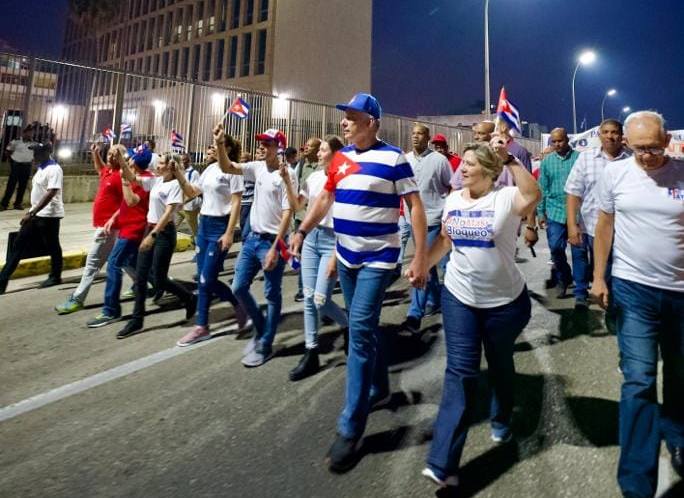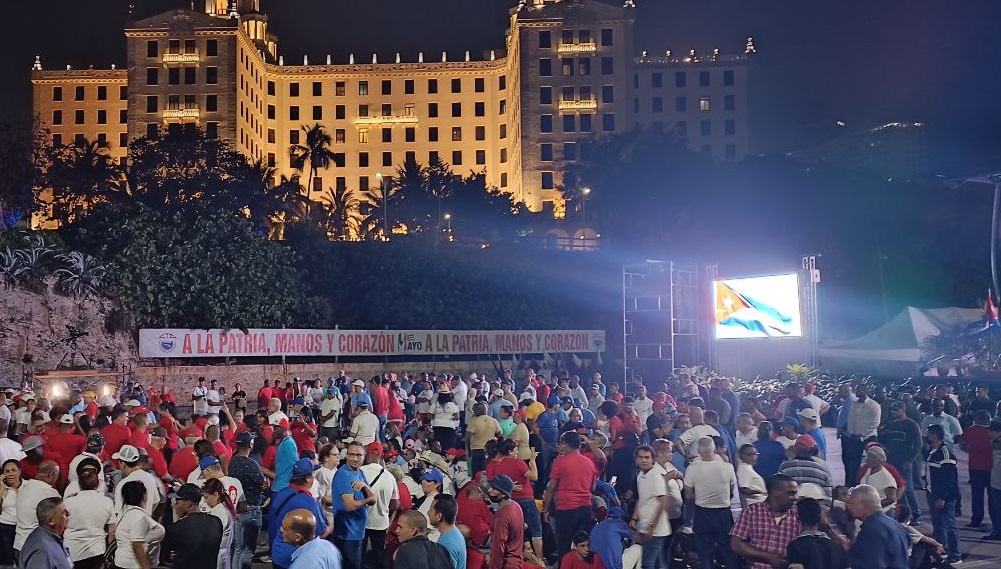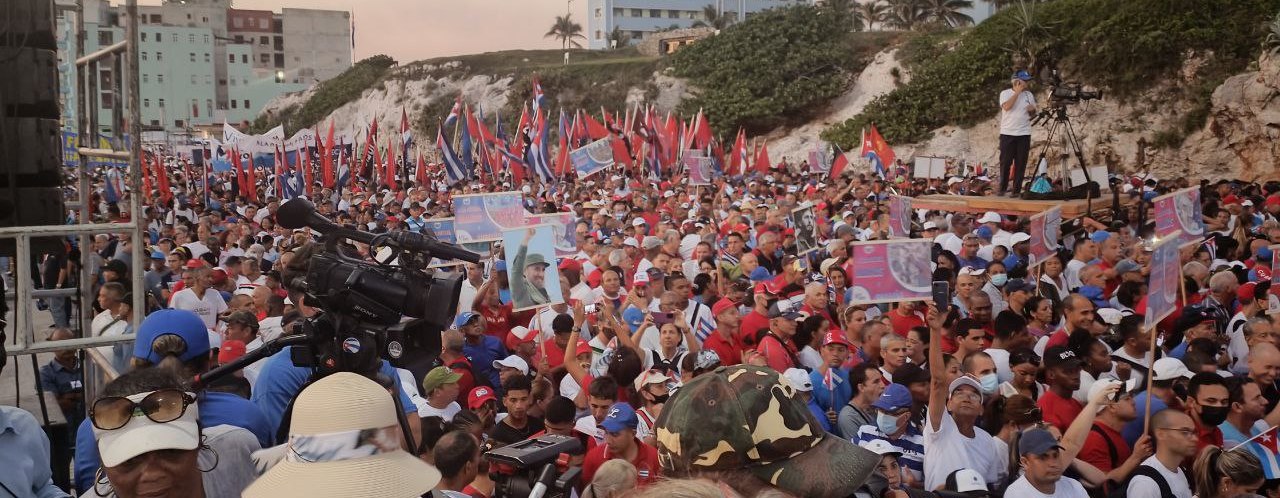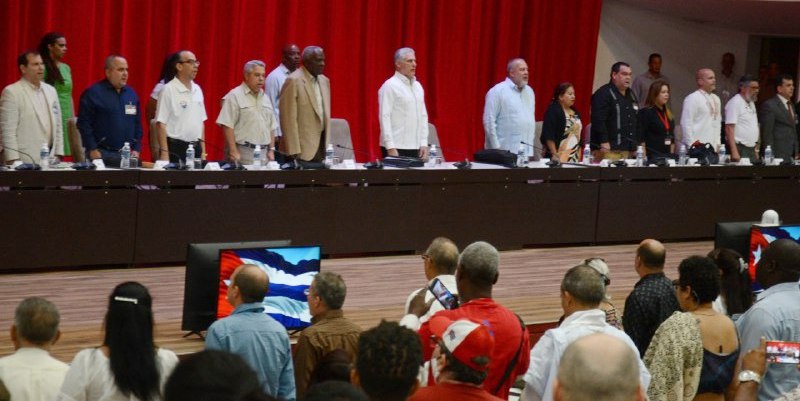No. 7
September 2023
Speak Out Against the Lies and Disinformation Designed to Isolate Cuba
• Do Not Permit Canada to Be Used As a Base Against Cuba!
• Facts Reveal Truth About Condition of Women in Cuba
Worldwide Campaign for One
Million Signatures to Remove Cuba from
U.S. List of State
Sponsors of Terrorism
• Reject Cuba's Spurious Designation as
"State Sponsor
of Terrorism"
47th Anniversary of Terrorist Bombing of Cuban Airliner
• Heinous Act for Which the U.S. Has Yet to Render Accounts
• A Glimpse into the Mind of a Terrorist
– Orlando Bosch
Speaks
on Miami TV
False Accusations About Chinese Spy Bases in Cuba
• Another Attempt to Smear Cuba
• Statement by Cuban Minister of Foreign Affairs
• Statement by Deputy Cuban Minister of Foreign Affairs
International Solidarity Meeting Held in Havana – May 2, 2023
• Human Solidarity Cannot Be Blockaded, It Remains an Indestructible Weapon of Struggle and Combat
Speak Out Against the Lies and Disinformation Designed to Isolate Cuba
Do Not Permit Canada to Be Used
As
a Base Against
Cuba!
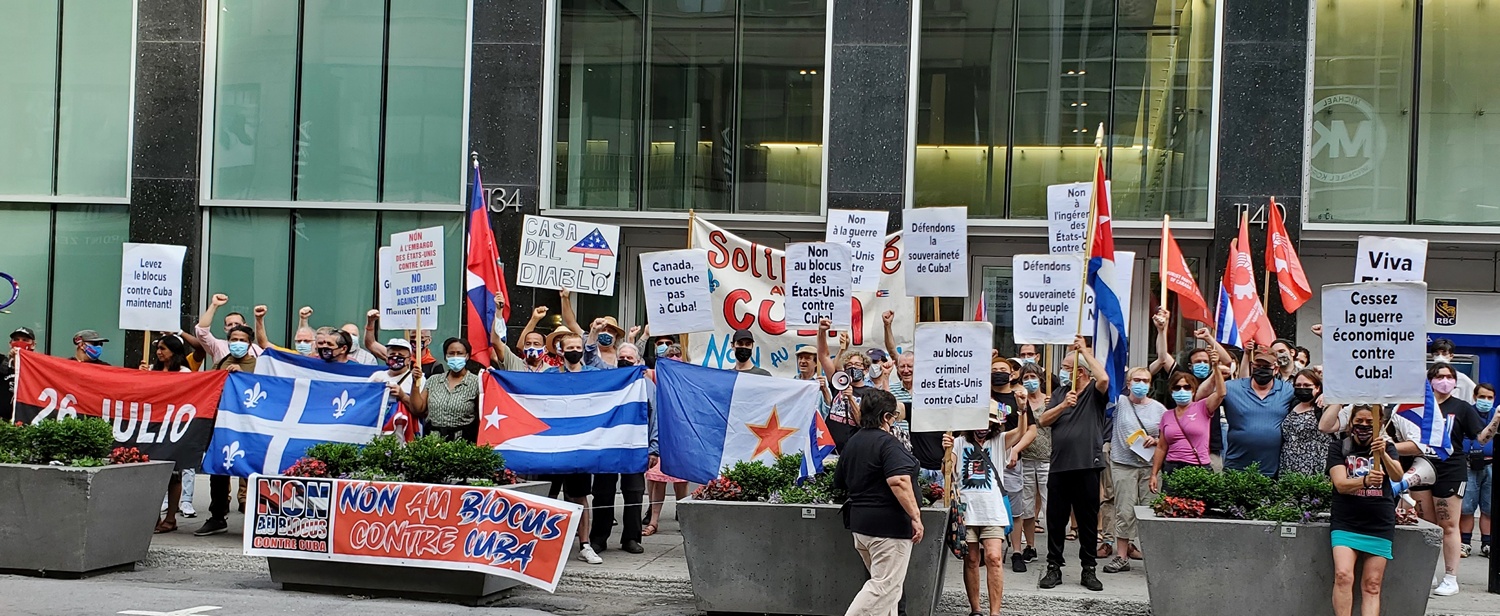
Action in Montreal in
solidarity with Cuba, July 17, 2021
As part of a campaign to discredit the Cuban government and institutions, a handful of anti-Cubans calling themselves Organizations in Canada of Cubans for Democracy are trying to use Canada as a base against Cuba. Their specialty is telling lies about the reality in Cuba and the achievements of the Cuban Revolution from a virulently anti-communist perspective. Anyone who has seen them in action knows they are hooligans incapable of political discourse. Blinded by hatred for the Cuban people who defend their Revolution, their level of culture is very low and their vocabulary is limited to disgusting misogynist accusations against women. The most recent filth they are trying to promote is a film entitled Plantadas by filmmaker Lilo Vilaplana. The film is being screened in Ottawa and Toronto on September 22 and 24 respectively with a high entrance cost and trailers on YouTube.[1]
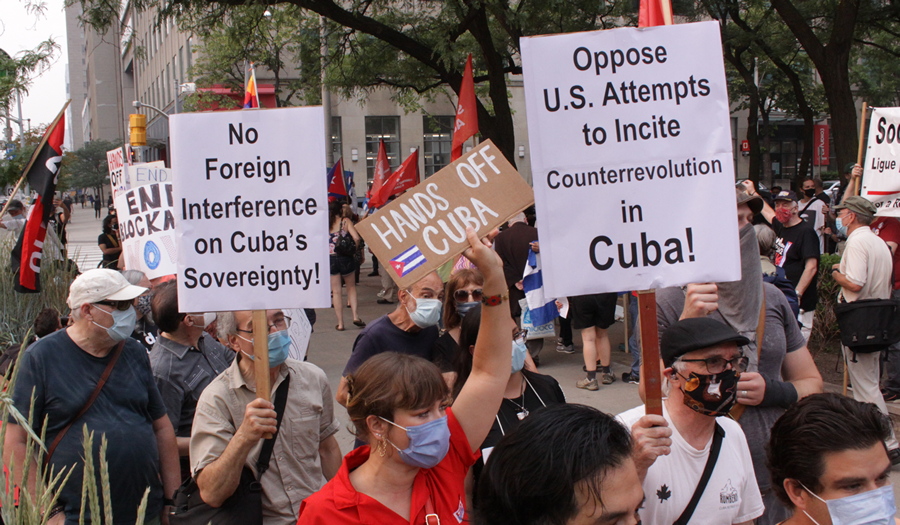
With this particular film, the promoters have picked a topic to attack Cuba which in the end will not win them any friends because it is such a pack of lies -- and that is the condition of women in Cuba. The film claims that in Cuba, since the Revolution, women have been degraded, downtrodden, disrespected and altogether violently abused. Film footage is invented and/or distorted to make this false narrative a horrifying spectacle.
The hand of the Miami anti-Cuban mafia and U.S. and other counterrevolutionary agencies determined to bring down the Cuban state is evident behind this film which is stock-in-trade anti-communism. The news media in Canada and reactionary academics are quick to pick up anti-Cuba accusations about human rights abuses and detention of political prisoners and mistreatment of prisoners by imposing ideology on facts to distort them and tell lies. It brings them no honour. On the contrary, it exposes them as two-bit anti-people elements who condone illegal acts against Cuba and the murderous U.S. blockade for an ideological cause and, no doubt in many cases, payment as well.
 Picket outside U.S. embassy in
Ottawa demanding an end to the blockade of Cuba, July 17, 2021
Picket outside U.S. embassy in
Ottawa demanding an end to the blockade of Cuba, July 17, 2021
It is not in the interests of Canadians to see their government or opposition parties promote false narratives about human rights, women's rights or the reality in Cuba. The anti-Cuba Miami mafia is known to have committed heinous crimes and even murders in Cuba by planting bombs, killing tourists, including Montrealer Fabio Di Celmo killed in the 1997 bombing of a Havana hotel. They bombed a civilian Cuban airliner in 1976 claiming the lives of 73 people. They run a radio station funded by the U.S. government which spews out lies 24/7 to incite Cubans and people in the U.S. to overthrow the Cuban government. All to no avail.
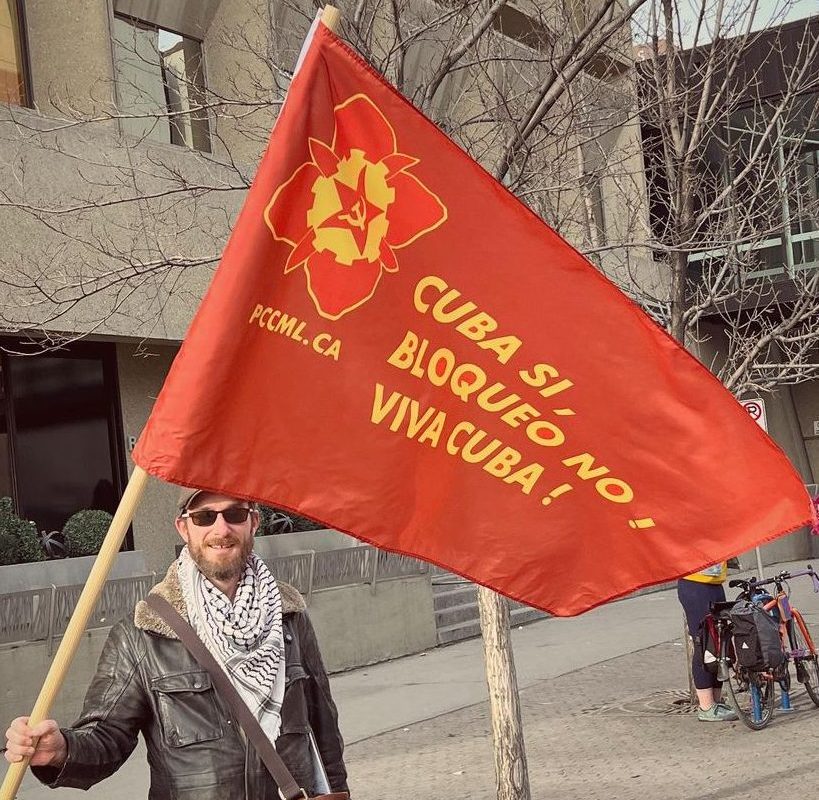 The Cuban people
have made their choice and are sticking to it despite more than 60
years of the inhuman U.S. blockade to deprive them of food, medicines,
medical equipment and access to everything they require to interact
normally in the fields of trade relations and people-to-people
exchanges.
The U.S. has put Cuba on a list of counties it claims are state
sponsors of terrorism and uses its hegemonic positions to deprive the
island of its rights to engage in trade and commerce.
The Cuban people
have made their choice and are sticking to it despite more than 60
years of the inhuman U.S. blockade to deprive them of food, medicines,
medical equipment and access to everything they require to interact
normally in the fields of trade relations and people-to-people
exchanges.
The U.S. has put Cuba on a list of counties it claims are state
sponsors of terrorism and uses its hegemonic positions to deprive the
island of its rights to engage in trade and commerce.
There is no more heinous violator of human rights than the government of the United States which to this day occupies Guatanamo Bay, a part of Cuban territory where it continues to maintain a detention camp where people are tortured and held without charges or trial for years. The Guantanamo detention centre, a torture site on occupied Cuban land, lies outside of U.S. jurisdiction so that impunity cannot be brought to account. This means that it is up to the peoples of the world, including the Canadian people, to speak out about the truth of the Cuban reality and not permit the spreading of lies about Cuba or anti-Cuban actions from any quarter.
The venom the counterrevolutionary forces spew, the ugly scenes they manage to conjure up in fact reveal their hatred for the Cuban people who overthrew the Batista regime which created a pleasure palace for the rich in the U.S. and a hell-hole for the Cuban people. The people of Cuba led by Fidel Castro and other legendary leaders of the Cuban Revolution established their own people's power and have defended it ever since. The venom and ignorance of those who lost their paradise is such that now, in their most recent film, they have decided to attack the women of Cuba – the very women who in Cuba stand second to none and who established their dignity as one of the most significant achievements of these more than 60 years of the Revolution.
The film maker Lilo Vilaplana is permitted into Canada under the guise that his film is made "to pay homage to the political prisoners who are victims of communism. Armed with conviction and courage, these women sacrificed their freedom for that of their country. The funds raised will go to Plantadas, a foundation that helps women imprisoned for having the courage to publicly criticize the Havana regime."
What freedom would that be? One of the most significant features of the neo-colonial era before 1959 that the annexationists like so much was the oppression of Cuban women.
Prior to 1959, women represented only 12 per cent of the country's total labour force. In general, they occupied jobs traditionally considered to be women's work and were generally paid a pittance. In 1953, six years before the Revolution, 76 per cent of the Cuban population over 10 years of age were literate. Corruption and discrimination prevailed with the majority of the people living a marginalized existence. Abuse of women by men of property was protected by the Batista dictatorship, which thrived from its casinos and pleasure palaces. The conditions women suffered explained why they joined the struggle against the dictatorship and took their place second to none in the July 26 Movement where they created the Mariana Grajales women's military platoon in the Sierra Maestra, among other great feats.
The Revolution created the conditions which outlawed violence against women, educated them, elevated them to positions of respect in all fields. They incorporated themselves in an integral and active way into educational and cultural programs, socially useful work and contributed to the development of the country. At last they could exercise control over their lives as producers and reproducers of life. They were no longer dependent on others for their living and nor were their children. Never again would the women of Cuba be relegated to the drudgery of housework and seen as mere objects of pleasure. Violence against them is outlawed in Cuba and those who commit crimes against women face the penalties prescribed by law.
In any country, it is the condition of women which reveals the truth about the kind of society which exists there and the kind of relations people enter into. By taking on the women of Cuba, the counterrevolutionaries who spew filth about the Cuban Revolution have once again sown the wind and they will reap the whirlwind. They will yet find out what mettle the women of Cuba are made of. We are confident that the women of Canada and Quebec and the people of this country will continue to stand as one with their counterparts in Cuba.
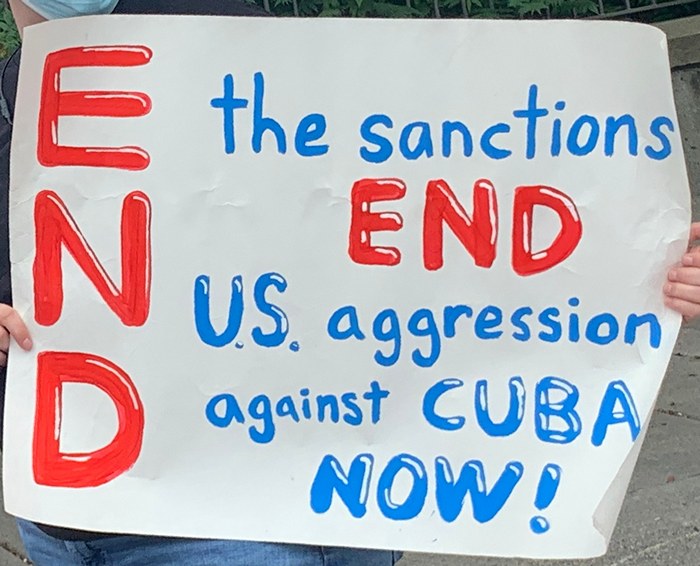
Note
1.
Film screenings, organized by Organizaciones de Cubanos por la
Democracia en Canada, are taking place:
Ottawa
Friday,
September 22, 7:00 pm, Desmarais Hall, 55 Laurier Avenue East, UOttawa,
Ottawa, Canada
Montréal
Saturday,
September 23, 6:00 pm, Cinema Université Concordia,
1400, boulevard De Maisonneuve Ouest, Édifice J.W. McConnell
(Librerie) Salle LB-125 J.A. DeSève
Toronto
Sunday, September 24, 7:00 pm,
Innis Town Hall Theatre, 2 Sussex Avenue Toronto. General
Admission CA $24.89
Facts Reveal Truth About
Condition
of Women in Cuba
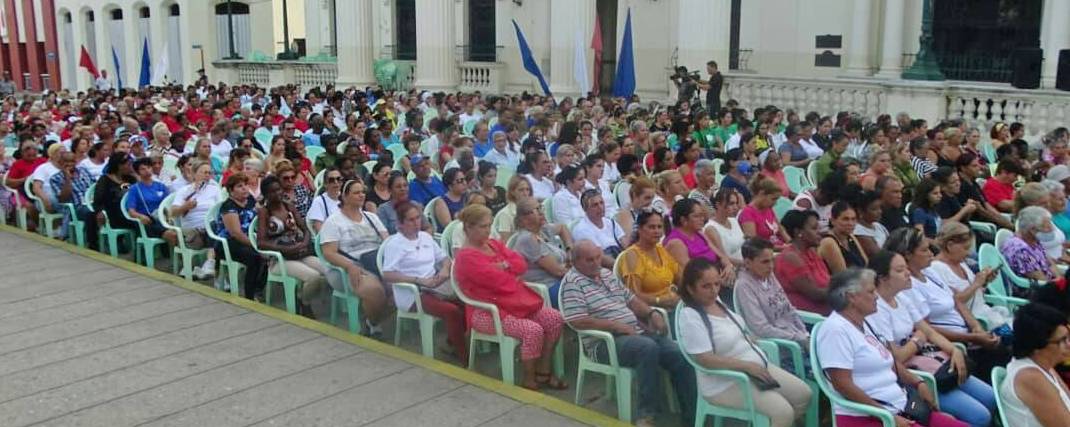
Celebration August 19,
2023, in Villa Clara of 63rd anniversary of Federation of Cuban Women.
 At present, the
Federation of Cuban Women (FMC) has a membership of more than four
million women. This organization, which emerged in the early years of
the Cuban Revolution, is dedicated to promoting the true emancipation
and integration of women in all spheres of life in the country.
At present, the
Federation of Cuban Women (FMC) has a membership of more than four
million women. This organization, which emerged in the early years of
the Cuban Revolution, is dedicated to promoting the true emancipation
and integration of women in all spheres of life in the country.
A considerable number of women today occupy positions of high responsibility in the country and carry out important professions such as doctors, architects, engineers, designers, scientists, graduates in legal sciences, history, journalism, and dozens of other disciplines.
Women represent 49 per cent of the people employed in public services. More than 80 per cent of women have a high school diploma or higher level of education. A majority of professional judges and prosecutors are women. They constitute 53.5 per cent of those who work in the system of sciences, innovation and technology; and they represent 69.6 per cent in the health sector. Specifically in the health sector, during the pandemic women represented 64 per cent of the personnel that made up the international medical brigades that provided assistance in more than 40 nations and represented 70 per cent of the scientists who were involved in the creation of the Cuban vaccines ABDALA and SOBERANA to face the COVID crisis.

Cuban medical brigade
arrives in Surinam, March 20, 2020 as the COVID pandemic begins. Women
made up 64 per cent of the personnel of the international medical
brigades.
Women are also a decisive part of the business sector. In the Cuban Parliament, they play a transcendental role in the construction of Cuba's model of independent development. They constitute 53.22 per cent of Cuban parliamentarians making Cuba's parliament the second highest in the world for female participation. Cuba was in fact the first country in the world to sign and the second to ratify the Convention on the Elimination of All Forms of Discrimination against Women.
These data are just a sample of facts that demonstrate the important role of women in Cuban society. Only the most backward reactionary anti-women elements can entertain the idea that Cuban women would permit the infamies they describe in their dirty little film. On the contrary, despite the colossal challenges facing the country, including the genocidal U.S. blockade, women in Cuba do not cease making relentless efforts to secure a better future for their families and compatriots. They decide what takes place in Cuba on an equal basis with all Cubans from all walks of life. They implement their decisions by making sure all the conditions are put in place for their realization. They defend what they themselves have created, with their very lives if need be. That is the reality of the Cuban woman.
On women's rights and gender equality:
- The fight against all forms of discrimination against women in all sectors of society has been a priority for the Cuban state and government.
- The Constitution specifically stipulates equal rights and responsibilities for men and women in all areas of society.
- It recognizes, protects and guarantees women's rights to health, including sexual and reproductive health and family planning.
- It recognizes women's rights to education, art and culture, as well as to decent employment and equal pay for equal work.
- Cuban women have the right to retraining in technical, professional and cultural work, vocational training and apprenticeship, and to social security and assistance.
- Working mothers are entitled to maternity leave and social protection during the first year.
- Social protection may be shared between the father and the mother, which promotes co-responsibility in child care and encourages women to stay at work and return to work.
On arbitrary detentions and political prisoners:
- In Cuba there are no arbitrary detentions or political prisoners.
- Detentions are carried out in accordance with criminal procedure for a crime stipulated by law.
- In Cuba, the broad guarantees of due process recognized by law are respected.
- The law establishes the procedures and circumstances that warrant detention.
- The law establishes the terms under which the detainee must be subjected to precautionary measures, be tried or released.
- The competent authorities analyze the decision to continue or not with the criminal process in each case, respecting all the guarantees.
- The decision to continue
or not with the criminal process is based on a rational, objective,
preventive
and individualized criminal policy.
- Common criminals cannot be presented as "political prisoners" or "human rights defenders".
- It is regrettable and saddening to see how fictitious lists of detainees are fabricated by those who distort the Cuban reality, in the service of the subversive policy of a foreign power.
Freedom of opinion, expression and the press:
- The freedoms of opinion, expression and press are fully recognized and protected by the Constitution and legislation.
- As in other countries, these rights cannot be used to violate the law.
- The material conditions necessary for the exercise of these rights are facilitated by the fact that, by constitutional mandate, the fundamental means of social communication in any of their manifestations and media cannot be privately owned, which guarantees that they are used exclusively in the service of the people and in the interest of the nation.
- The Cuban State has created and continues to strengthen extensive instruction and education programs in all spheres and stages of people's lives.
- These instruction and education programs, open to all without discrimination, are aimed at increasing people's ability to exercise their rights to freedom of expression and opinion in a responsible and uninterrupted manner.
- Strengthening access to the Internet and the development of digital platforms are a priority for the Cuban government.
- Internet access has allowed the Cuban people to have access to more information from diverse and pluralistic sources, to form and express their own opinions on the most varied phenomena and issues of the country and the world.
Worldwide
Campaign for One Million Signatures to Remove Cuba from
U.S.
List of State Sponsors of Terrorism
Reject Cuba's Spurious Designation as "State Sponsor of Terrorism"
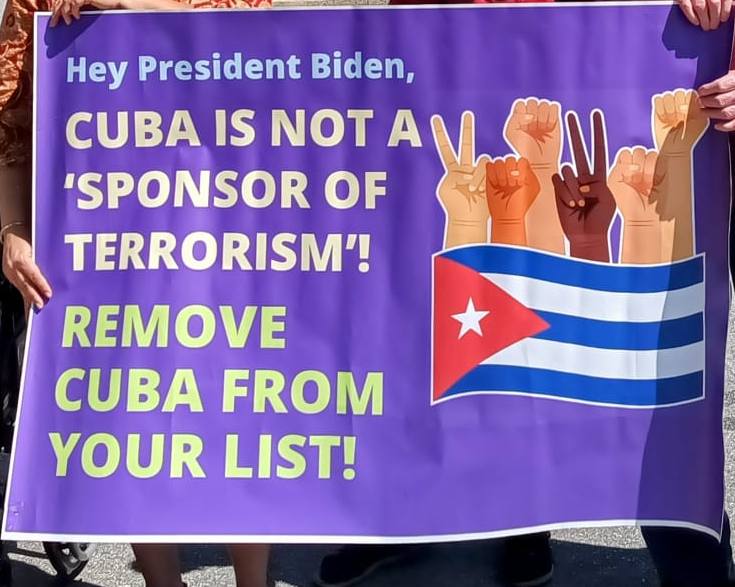 In the wake of
the September 11 attacks on the Twin Towers in New York
City and the Pentagon in Washington, DC, 22 years ago, then U.S.
President George W. Bush, at a joint session of U.S. Congress on
September 20, 2001, issued an edict to the peoples of the world.
"Either you are with us or you
are with the terrorists. From this day forward, any nation that
continues to harbor or support terrorism will be regarded by the United
States as a hostile regime." Bush stated in the same speech that the
U.S. war on terror "will not end until every terrorist group of global
reach has been found,
stopped and defeated."
In the wake of
the September 11 attacks on the Twin Towers in New York
City and the Pentagon in Washington, DC, 22 years ago, then U.S.
President George W. Bush, at a joint session of U.S. Congress on
September 20, 2001, issued an edict to the peoples of the world.
"Either you are with us or you
are with the terrorists. From this day forward, any nation that
continues to harbor or support terrorism will be regarded by the United
States as a hostile regime." Bush stated in the same speech that the
U.S. war on terror "will not end until every terrorist group of global
reach has been found,
stopped and defeated."
Take note that Bush did not say "either you are with us or against us," he said "or with the terrorists." The central issue is who defines what constitutes terrorism, what is the definition, and who is a terrorist. It is the United States, the world's greatest terrorist country, that gave this definition, and on the basis of its decisions it waged a war of terror against the whole world.
In January 29, 2002 Bush then delivered his infamous "axis of evil" speech to describe foreign governments that, during his administration, allegedly sponsored terrorism and sought weapons of mass destruction. He initially named the Democratic People's Republic of Korea (DPRK), Iran, and Iraq as "an axis of evil, arming to threaten the peace of the world."
The U.S. gave itself the right to carry out all manner state-organized terrorist attacks aimed at regime change in other countries spuriously claimed to be harbouring terrorists. Within the U.S. and countries in its sphere of influence, broad campaigns of Islamophobia began, in which anyone could be declared a terrorist or potential terrorist until proven otherwise. It engaged in mass murders through sanctions, misguided bombing raids, torture, detention without charges and trials, assassinations and murders.
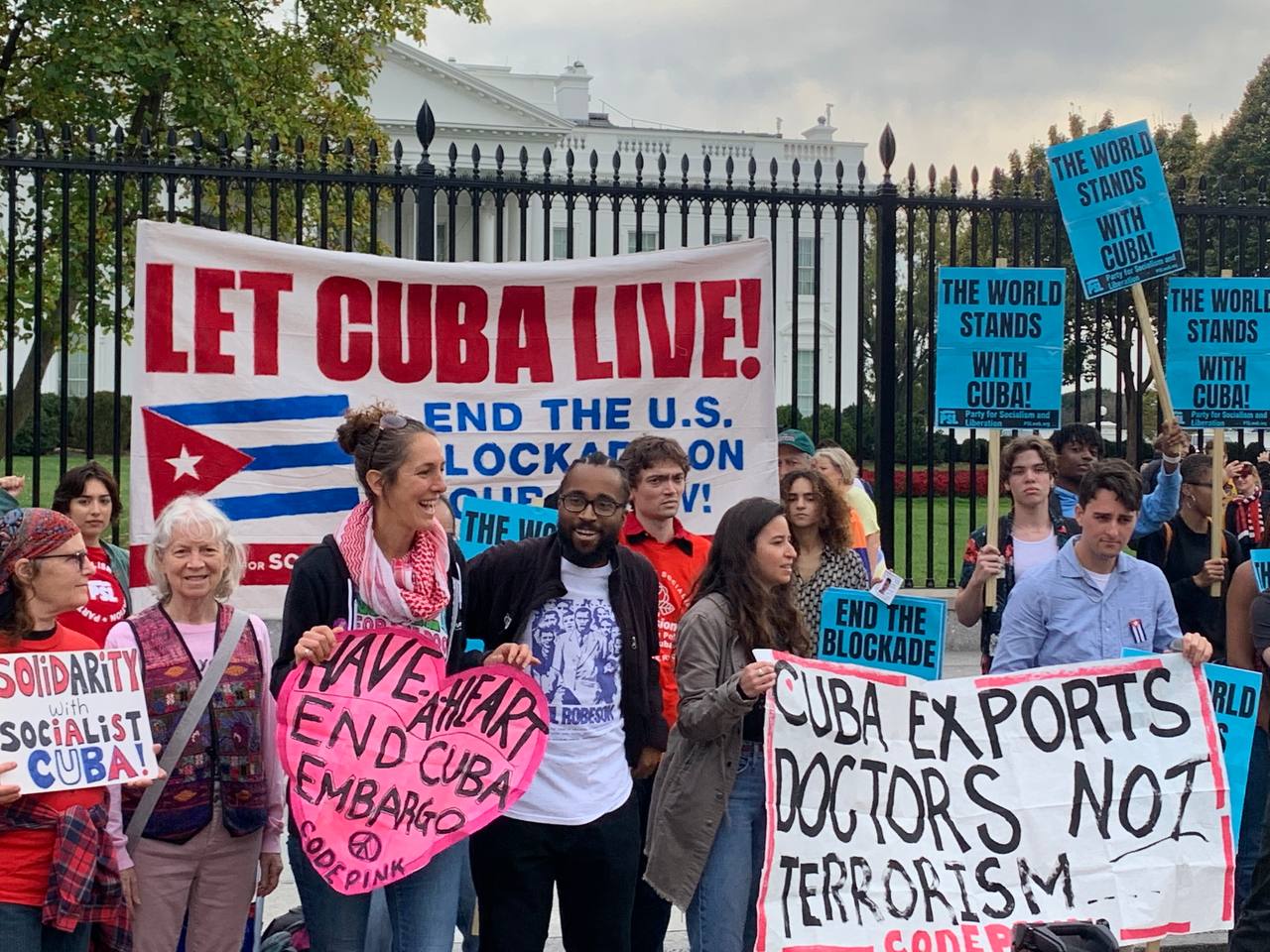 Long
before 9/11, in 1979, the U.S. had established a list of those it
accused of being state sponsors of terrorism. Iraq, Libya, South Yemen
and Syria appeared on that list. It then modified the list on various
occasions and today, in 2023, there are four countries on the list:
Cuba, Iran, the
DPRK and Syria. These are countries known for opposing U.S. imperialism
and foreign interference in their internal affairs. It is also known
that they have been targets of U.S. coups and/or outright military
aggression, invasion and occupation and vicious human rights violations
using various means.
The list can thus be seen as a hit list of countries that block U.S.
imperialist aims for hegemony in various parts of the world.
Long
before 9/11, in 1979, the U.S. had established a list of those it
accused of being state sponsors of terrorism. Iraq, Libya, South Yemen
and Syria appeared on that list. It then modified the list on various
occasions and today, in 2023, there are four countries on the list:
Cuba, Iran, the
DPRK and Syria. These are countries known for opposing U.S. imperialism
and foreign interference in their internal affairs. It is also known
that they have been targets of U.S. coups and/or outright military
aggression, invasion and occupation and vicious human rights violations
using various means.
The list can thus be seen as a hit list of countries that block U.S.
imperialist aims for hegemony in various parts of the world.
Cuba was first placed on the list in 1982. Notably, on December 17, 2014, then U.S. President Barack Obama ordered a review of Cuba's inclusion on the list. On April 14, 2015, Obama announced that Cuba was being taken off the list, and after a 45-day period of review it was officially removed on May 29, 2015.
Toward the end of the Trump administration, on January 12, 2021, Cuba was once again added to the list. Then Secretary of State Mike Pompeo claimed that Cuba had "repeatedly provid[ed] support for acts of international terrorism" by harboring U.S. fugitives as well as Colombian rebel leaders. Another accusation was that Cuba supported Venezuelan President Nicolás Maduro during attempts by the U.S., Canada and the Lima Group to overthrow his government. The U.S. claimed that the Maduro administration created "a permissive environment for international terrorists to live and thrive within Venezuela."
The facts of life amply show who are the terrorist states which also sponsor state terrorism. Cuba's inclusion on the list is indicative of U.S. revanchism toward this small country that has successfully defended itself despite the murderous U.S. all-sided blockade of the island for more than 60 years. The U.S. State Department's Bureau of Counterterrorism writes:
"Countries determined by the Secretary of State to have repeatedly provided support for acts of international terrorism are designated pursuant to three laws: section 1754(c) of the National Defense Authorization Act for Fiscal Year 2019, section 40 of the Arms Export Control Act, and section 620A of the Foreign Assistance Act of 1961). Taken together, the four main categories of sanctions resulting from designation under these authorities include restrictions on U.S. foreign assistance; a ban on defense exports and sales; certain controls over exports of dual use items; and miscellaneous financial and other restrictions."
In August of this year, a global campaign was launched to submit one million signatures on a letter to U.S. President Joe Biden demanding that Cuba be removed from this list. The letter and signatures are to be delivered on December 10, International Human Rights Day. This campaign is part of broader efforts to end the U.S. unjust and genocidal blockade against Cuba and to demand that the U.S. restart the process to normalize relations with Cuba.
All out to join this campaign which has presently already reached nearly 214,000 signatures!
Visit LetCubaLive.info campaign website to sign the petition and send it to others to sign and ask them to send to others.
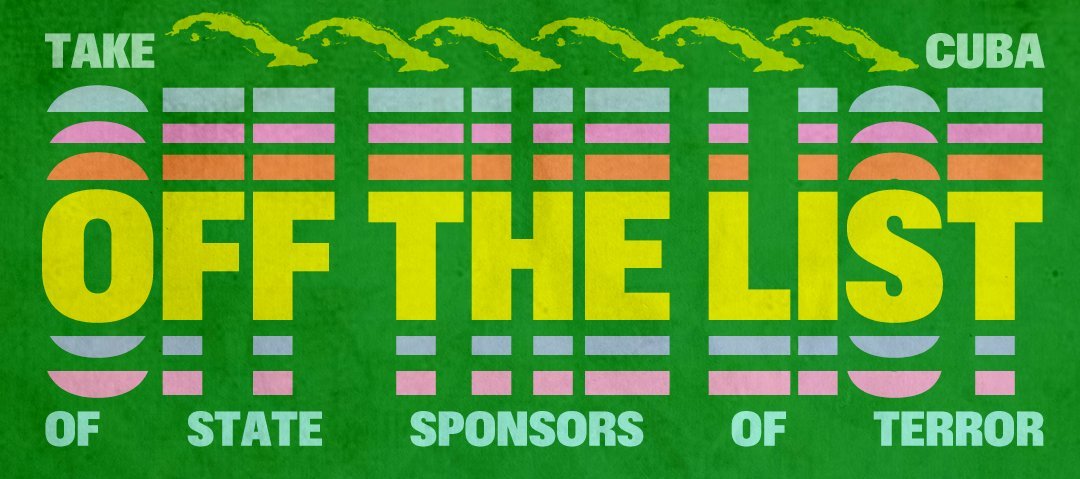
47th Anniversary of Terrorist Bombing of Cuban Airliner
Heinous Act for Which the U.S.
Has Yet
to Render Accounts

2015 march honouring the
victims of the bombing of Air Cubana Flight 455 by
U.S.-backed
anti-Cuba terrorists.
This October 6 marks the 47th anniversary of the bombing of Air Cubana Flight 455 by U.S.-backed anti-Cuba terrorists. This heinous act of terrorism was one of many carried out against Cuba with U.S. backing from the 1960s to the 1990s and since then. In 2010, Cuba began to commemorate this date as the "Victims of State Terrorism Day." On this day, Cuba commemorates its 3,478 citizens who have died and 2,099 who have been permanently disabled by acts of terrorism, a total of 5,577 victims. These figures do not include victims from other countries, including Canada, killed or injured during terrorist attacks aimed at Cuba.
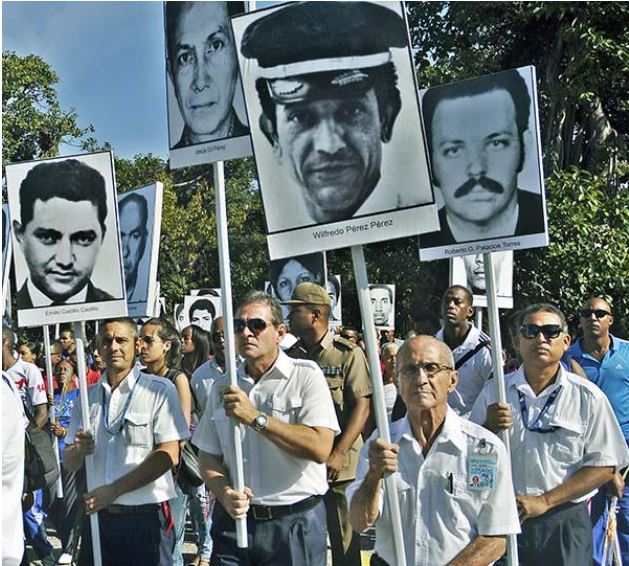
On this occasion, CPC(M-L) reiterates its condemnation of the U.S. blockade of Cuba, which is both illegal and internationally condemned. The blockade profoundly violates the human rights of the Cuban people and is carried out with the same vicious aim of causing death and destruction as the bombing of Air Cubana Flight 455. CPC(M-L) also condemns the U.S. government for putting Cuba back on its spurious "state sponsors of terrorism" list, citing Cuba's support for the Venezuelan people and their affirmation of their right to be through the Bolivarian Revolution as support for "terrorism." It condemns the act of terrorism against the Cuban Embassy in Washington, DC on April 30, 2020 when a Cuban expatriate living in the U.S. sprayed the front of the embassy building with over 30 rounds using an AK-47 assault rifle. Luckily none of those inside at the time were injured. To this day the U.S. government has never condemned that attack, which could well have resulted in deaths, as the perpetrator admitted to law enforcement was his intention. CPC(M-L) also condemns the actions of hooligan elements in Canada and their benefactors from Miami who do their best to incite social violence in Cuba and then when Cuba defends peace and acts according to its rule of law, they spread smear campaigns and get Canadian media to join them.
|
Today, having failed in their mission of achieving regime change, more frenetic attempts are being made to stir counterrevolutionary rebellion within Cuba and against Cuba abroad, using the difficulties the people face as a result of the U.S. blockade to incite opposition to the government. The allegedly peaceful protestors are incited, funded and used by the U.S. and the disturbances have nothing to do with a political movement against the government. In this vein, in the early morning hours of July 27, 2021, three incendiary devices were thrown at the Cuban Embassy in Paris. Two of the "Molotov cocktails" hit the facade and entrance of the building. Embassy personnel were able to put out a fire that had started and there were no injuries. Families with children were inside the building at the time of the attack.
CPC(M-L) calls on Canadians to hold the U.S. government responsible for all these acts of counterrevolution and terrorism. Canadians should also call on Canada and its media, academics and pundits to disassociate themselves with the acts of hooliganism, terrorism and violence against Cuba. Canada should stop condoning these attacks by claiming they are political when nothing but filthy trash talk comes out of the mouths of the allegedly peaceful protestors. The nonsense that Cuba is totalitarian and authoritarian to then claim the U.S., Canada and others are democratic should stop. It is to divert attention away from who is responsible for the violence in Cuba and to undermine the opposition to the U.S. blockade of Cuba and support for Cuba which is widespread in Canada. Canada should also take action against the use of Canadian territory for purposes of enforcing the illegal blockade and for spreading calumnies against Cuba.
For the U.S. to tighten the blockade at this time as well as its listing of Cuba as a state which sponsors terrorism, is for purposes of inciting violence in the hopes of achieving regime change. The fact that it considers the people of Cuba dispensable is ample proof of what U.S. democracy and human rights stand for.
CPC(M-L) denounces the Biden administration for spreading lies and disinformation for the purpose of demonizing Cuba's leadership and the supporters of revolutionary Cuba, and inciting counterrevolutionary elements to engage in violent acts like those that took place on July 11, 2021. It calls on the Canadian government to take no part in such vile activity and instead demand that the U.S. end its criminal economic war against Cuba. The Cuban people must be allowed to solve their problems on their own without outside interference or threats, something they are more than capable of doing.
The anniversary of the bombing of Air Cubana Flight 455 is a timely reminder to Canadians and Quebeckers of the need to end Canada's appeasement of U.S. imperialism and state terrorism and ensure that Canada is a zone of peace, with its own independent foreign policy that upholds the rule of international law. This includes standing up for Cuba's right to be, free from outside interference, terrorism and all forms of aggression, including the unjust U.S. blockade.
A Glimpse into the Mind of a
Terrorist --
Orlando Bosch Speaks
on Miami TV
On the occasion of the 47th anniversary of the downing of a Cuban passenger plane with 73 people on board, as a result of bombs planted by anti-Cuban terrorists, TML is reprinting an article by José Pertierra who contributed it to Counterpunch.org in 2006. Pertierra, an attorney, practicing in Washington, DC, represented the Venezuelan government in the case of terrorist Luis Posada Carriles who had committed crimes in Venezuela.
Take note that when this article was written, the Cuban Five were still in jail in the United States and Luis Posada Carriles and Orlando Bosch were still alive. It fully conveys the mind of the anti-Cuba terrorists who blew up the Cuban passenger airline and the support and organization they have received from the highest echelons of the United States. It is the same mind of those who have inherited their mantle and today accuse Cuba of human rights abuses and torture. And they too enjoy the support of the highest echelons of the U.S. government and like-minded supporters in Canadian official circles, media and academia.
Last week in Miami, Luis Posada Carriles's accomplice in the downing of the Cuban passenger plane that was blown out of the sky with 73 innocent people on board on October 6, 1976 was interviewed by Juan Manuel Cao of Channel 41 in Miami. His name is Orlando Bosch.
I quote verbatim excerpts from the television interview.
Juan Manuel Cao: Did you down that plane in 1976?
Orlando Bosch: If I tell you that I was involved, I will be inculpating myself . . . . and if I tell you that did not participate in that action, you would say that I am lying. I am therefore not going to answer one thing or the other.
Juan Manuel Cao: In that action 76 persons were killed [the correct figure is 73, including a pregnant passenger]?
Orlando Bosch: No chico, in a war such as us Cubans who love liberty wage against the tyrant, you have to down planes, you have to sink ships, you have to be prepared to attack anything that is within your reach.
Juan Manuel Cao: But don't you feel a little bit for those who were killed there, for their families?
Orlando Bosch: . . . Who was on board that plane? Four members of the Communist Party, five north Koreans, five Guyanese, [JP: there were really 11 Guyanese passengers] . . . concho chico, four member of the Communist Party chico!!! Who was there? Our enemies . . . .
Juan Manuel Cao: And the fencers? The young people on board?
Orlando Bosch: I was in Caracas. I saw the young girls on television. There were six of them. After the end of the competition, the leader of the six dedicated their triumph to the tyrant etc etc. She gave a speech filled with praise for the tyrant. We had already agreed in Santo Domingo, that every one who comes from Cuba to glorify the tyrant had to run the same risks as those men and women that fight alongside the tyranny.
Juan Manuel Cao: If you ran into the family members who were killed in that plane, wouldn't you think it difficult . . . ?
Orlando Bosch: No, because in the end those who were there had to know that they were cooperating with the tyranny in Cuba.
Bosch's answers to those five questions give us a glimpse into the mind of the kind of terrorist that the United States government harbors and protects in Miami: terrorists that for the last forty-seven years have waged a bloody and ruthless war against the Cuban people.
What happened to Cubana de Aviación 455 almost thirty years ago is no secret. We need simply examine the CIA's own declassified cables. At the time, this was the worst act of aviation terrorism in history, and the first time that a civilian airliner was blown up by terrorists.
More than three months before CU-455 was blown out of the sky over Barbados on that sunny Wednesday afternoon of October 6, 1976, the Central Intelligence Agency (CIA) informed Washington that a Cuban exile extremist group planned to place a bomb on a Cubana de Aviación flight.
The State Department's Bureau of Intelligence and Research reported to Secretary of State Henry Kissinger that a CIA source had overheard Luis Posada Carriles say less than a month prior to the bombing that "we are going hit a Cuban airliner."
Neither Washington nor the CIA alerted Cuban authorities to the terrorist threat against their planes.
The bombing was carried out by Luis Posada Carriles, Orlando Bosch, Hernán Ricardo and Freddy Lugo. Final preparations for the terrorist act began with the arrival of Orlando Bosch in Caracas on September 8, 1976. Bosch is a Cuban-born terrorist who was the acknowledged leader of an organization called Coordinación de Organizaciones Revolucionarias Unidas (CORU).
According to the FBI, CORU was an umbrella group of Cuban exile organizations that was formed to "plan, finance and carry out terrorist operations and attacks against Cuba." (FBI cable dated June 29, 1976.)
When Bosch arrived in Caracas on the 8th of September of that year, Posada Carriles was there to greet and make available to him his right hand man: trusted confidante Hernán Ricardo, who has admitted under oath to be a CIA operative. In 1976, Ricardo was also an employee of Luis Posada Carriles at a private intelligence firm that the latter founded and ran in Caracas: Investigaciones Comerciales e Industriales (ICI). Ricardo says that Posada Carriles introduced him to Orlando Bosch at the ICI offices in Caracas.
To help him with the special operation that Bosch and Posada planned for him, Ricardo in turn recruited Freddy Lugo. A Venezuelan citizen, Lugo has also admitted under oath to be a CIA operative.
We know that the foursome of Posada, Bosch, Ricardo and Lugo met together at least four times to plan the downing of the plan.
At the meetings, the terrorists agreed upon the coded words they would use to describe the success of the operation. The plane would be known as the "bus," and the passengers would be called the "dogs." "The rest is up to you," Posada told Lugo and Ricardo.
The C-4 explosives were carried on board the aircraft by Ricardo and Lugo in a tube of toothpaste and in a camera.
Freddy Lugo and Hernán Ricardo boarded the CU-455 flight in Trinidad at 12:15 PM bound for Barbados. Ricardo traveled under a forged passport using a false name. They sat in the middle of the plane. During the flight, they placed the C-4 explosives in two separate places in the plane: the rear bathroom and underneath the seat belonging to Freddy Lugo. Lugo and Ricardo got off the plane during its brief stopover at Seawell Airport in Barbados. They later admitted under oath that they had each received special training in explosives from the CIA.
Aboard CU-455 were 73 persons. Fifty-seven of the passengers were Cubans. Eleven of them were Guyanese medical students in Cuba. The remaining five passengers were Koreans. Those on board averaged only 30 years of age.
Traveling with the group were 24 members of the Cuban fencing team, many of them teenagers, fresh from gold medal victories at the Youth Fencing Championship in Caracas. They proudly wore their gold medals on board the aircraft. One of the young fencers, Nancy Uranga, was only twenty-three years old and pregnant. She wasn't supposed to be on board. That spot on the fencing team belonged to a pretty little twelve-year old fencer, unusually tall for her age, named María González. María had planned to participate in the Caribbean Games, and was on the tarmac at Havana's José Martí Airport ready to board the plane that would take the team to the Games, when one of her coaches gave her the bad news that international amateur rules prevented twelve-year-olds from competing. María reportedly was devastated, and she went to her home in Havana's neighborhood called La Víbora, and cried for three days, refusing to watch the games on Cuban television because it hurt her so much not to be there. Nancy Uranga was summoned to the Airport and took María's place on the ill fated trip to the Caribbean Games.
The fencing team was a roaring success at the Games. They won gold, silver and bronze medals. They were to return home on October 6, 1976. The athletes proudly wore their medals dangling over their clothes, as they boarded the aircraft. Cubana de Aviación 455 stopped first in Trinidad at 11:03 AM, and then touched down again in Barbados at 12:25 PM.
Nine minutes after take-off from Barbados, the bombs exploded and the plane caught fire. The passengers on board then lived the most horrifying ten minutes of their lives, as the plane turned into a scorching coffin.
The cockpit voice-recorder captured the last terrifying moments of the flight at 1:24 PM: "Seawell! Seawell! CU-455 Seawell. . . ! We have an explosion on board. . . . . We have a fire on board."
The pilot, Wilfredo Pérez (affectionately known as "Felo"), asked Seawell Airport for permission to return and land, but the plane and its passengers were already doomed.
As the plane approached the shore, it was rapidly losing altitude and control. "Hit the water, Felo, Hit the Water," said the co-pilot.
Rather than crashing into the white sands of the beach called Paradise and killing the beachgoers, Felo courageously banked the plane toward the water where it crashed in a ball of fire one mile north of Deep Water Bay.
Pieces of bodies were slowly recovered from the sea. Most of them too grotesquely disfigured to be identified by their family members. There were no survivors.
After deplaning, Lugo and Ricardo hurriedly left Seawell Airport in Barbados and checked into a local hotel under assumed names.
From the hotel, Hernán Ricardo called his bosses in Venezuela: Orlando Bosch and Luis Posada Carriles. Unable to find Posada at his desk, he left a message with Posada's secretary. He then called Caracas again and asked a mutual friend, Marinés Vega, to deliver the following message to Posada:
"We are in a desperate situation, the bus was fully loaded with dogs . . . they should send someone I can recognize . . . I will be waiting in a soda fountain near the embassy just in case something happens and I need to ask for asylum there."
Ricardo was able to communicate with Bosch who allegedly said to him: "My friend we have a problem here in Caracas. An aircraft is never blown up in midair . . .", implying that the plan had been for the bomb to explode while the plane was on the ground before take-off.
Sensing how hot things were getting for them in Barbados, Lugo and Ricardo boarded a return flight to Trinidad on British West Indies Airlines that very evening. On the flight, Ricardo said to his buddy: "Damn it, Lugo, I'm desperate and feel like crying. I had never killed anyone before."
In Port of Spain, the terrorists checked into the Holiday Inn with false identities and made more desperate calls to Caracas, trying to reach Posada Carriles.
Their nervous demeanor at the airport and at the hotel, as well as their conversations in the taxis they took in Barbados and later in Trinidad, led the police to zero in on them as the primary suspects in the bombing. They were arrested and interrogated by detectives from the Trinidad police department.
Both confessed to Commissioner Dannis Ramdwar who took their written depositions. Lugo and Ricardo each admitted to being CIA operatives. Ricardo described in detail how he could detonate C-4 explosives and pointed to a pencil on Ramdwar's desk that was similar to the timer he used to detonate the explosive on board the plane. Ricardo also told the police in Trinidad that he worked for Luis Posada Carriles. He told Ramdwar that the head of CORU was Orlando Bosch and drew for the police an organizational chart of CORU and said that the terrorist organization was also known as Condor.
Upon hearing of the confessions of Lugo and Ricardo, the police in Caracas moved in and arrested Posada and Bosch. They also obtained a warrant and searched the offices of Posada Carriles where they confiscated weapons and sophisticated electronic monitoring equipment. The police also found a schedule of Cubana flights in Posada's Caracas office.
In one of the very first reports on the October 6, 1976, downing of Cubana Flight 455, the FBI Venezuelan bureau cables that a confidential source has identified Luis Posada and Orlando Bosch as responsible for the bombing. "The source all but admitted that Posada and Bosch had engineered the bombing of the airline," according to the report.
During the television interview three days ago in Miami, Bosch talked about an agreement reached between terrorists in Santo Domingo in June of 1976.
The FBI itself tells us about that secret agreement. According to an FBI report, Orlando Bosch, Luis Posada Carriles and other terrorists formed an umbrella terrorist organization called CORU at a meeting in the Dominican Republic. The FBI report details how at that meeting in the Dominican Republic, CORU planned a series of bombing attacks against Cuban entities, as well as the murder of Communists in the Western Hemisphere. On page 6, the report relates in great detail how Orlando Bosch was met in Caracas on September 8, 1976, by Luis Posada and other anti-Castro exiles and a deal was struck as to what kind of activities he could organize on Venezuelan soil.
After the arrests of Lugo, Ricardo, Bosch and Posada, Trinidad, Barbados, Guyana and Cuba ceded jurisdiction over the downing of the passenger plane to Venezuela, and all four were prosecuted in Caracas for murder.
Prosecuting terrorists has a price. The judge who issued the initial arrest warrants for the four terrorists, Delia Estava Moreno, received several death threats and attempts at blackmail as reprisals for her conduct. As a result, she was forced to recuse herself. The presiding judge of the military court, Retired General Elio Garcia Barrios, also received death threats and in 1983, his son and chauffeur were murdered during a Mafia-style hit intended to even the score and intimidate those who dared legally prosecute the murderers.
Eventually, Lugo and Ricardo were convicted, but before the Court could reach a verdict regarding his case, Luis Posada Carriles escaped from the prison at San Juan de los Moros in the State of Guárico where he had been confined after two unsuccessful escape attempts.
Posada escaped with the help of at least $50,000 from a right-wing extremist group in Miami.
Fifteen days after his escape from jail, Posada was smuggled out of Venezuela bound for Aruba on a shrimp boat. He spent a week in Aruba and was then flown by private plane to Costa Rica and then San Salvador. He immediately started working alongside Felix Rodriguez, a high ranking CIA member, at the Ilopango Airbase. Posada's job in San Salvador was to supply the Nicaraguan Contras with arms and supplies obtained through the sale of narcotics. This Operation became a scandal known as Iran-Contra. Felix Rodriguez was the CIA's point man in Central America for the Iran-Contra scandal, hired for the job by an old friend from the CIA Donald Gregg who was Vice-President Bush's National Security Advisor. According to Anna Louise Bardach who interviewed Posada while she was a reporter for the New York Times, "Posada noted with a certain pride that George Bush had headed the CIA from November 1975 to January 1977" -- a period that covered some of the most violent crimes committed by Cuban exiles and Operation Condor: including the Letelier assassination and the downing of the passenger plane.
Posada spent the next several years in Central America working for the security services of El Salvador, Guatemala and Honduras. But in the early '90s he turned his attention once again to Cuba which was struggling to jump start a tourist industry in order to offset a dramatic economic downturn after the demise of the Soviet Bloc. From his lair in Central America he recruited Salvadoran and Guatemalan mercenaries to smuggle explosives to Cuba, and in 1997 bombs began to blow in the finest hotels and restaurants of Havana-killing an Italian tourist named Fabio DiCelmo and wounding several others.
Cuba learned that the campaign of terror against its tourist industry was being financed by Miami exile organizations and orchestrated by Luis Posada Carriles in Central America. Faced with the FBI's refusal to reign in the terrorists in Miami, Cuba sent some very brave men to penetrate these terrorist organizations and gather information with the purpose of asking President Clinton to intervene and order the Feds to arrest the terrorists.
After gathering enough evidence to determine the source of the terror campaign, on May 1, 1998 Fidel Castro sent a personal emissary to Washington with a handwritten message to President Clinton: the emissary was none other than Nobel Prize for Literature Gabriel García Márquez. President Clinton was out of town for several days in California, and after waiting him out at the Hotel Washington for several days, García Márquez finally met with White House Chief of Staff Mac McLarty and gave him the letter. García Márquez recounts McLarty's reaction to the letter and quotes McLarty as saying to him: "We have enemies in common: terrorists."
In the wake of the Garcia Marquez visit, the U.S. sent an FBI team to Cuba a month later to discuss collaboration with Cuba on a "War On Terror." Cuba handed over to the FBI tapes of 14 telephone conversations of Luis Posada Carriles' with details on the series of bombs that had exploded in Cuba in the '90s. Cuba also gave the FBI Luis Posada Carriles' addresses in El Salvador, Honduras, Costa Rica, Guatemala and Panama. Also tapes of conversations with Central American detainees in Cuba who admitted Posada is their boss. All together, Cuba turned over 60 sets of documents with information about 40 terrorists based in Miami, including their addresses, and evidence of their ties to terror.
Cuba then waited . . . and waited . . . and waited. Cuba waited for the FBI to start arresting terrorists. But instead the FBI arrested on September 12, 1998, the men now known as the Cuban Five: the men who had come to Miami to penetrate the Miami exile terrorist organizations.
According to El Nuevo Herald, the first persons that were notified of the arrests of the Cuban Five were Cong. Lincoln Diaz Balart and Ileana Ros-Lehtinen of Miami.
The Five were charged with 62 counts of violating federal laws. Their arrests illustrates Washington's double standard when it comes to its so-called war on terror: a war that the U.S. government chooses to fight a la carte, distinguishing between terrorists it likes and those it doesn't.
The Five were placed in solitary confinement for the next 17 months, until the start of their trial. They were convicted of several charges and received the maximum sentences possible. Gerardo Hernandez received a double life sentence and Antonio Guerrero and Ramon Labañino on life sentence each. Fernando Gonzalez and René Gonzalez, got 19 and 15 years respectively.
They were sent to maximum security prisons across this country, and two of them have been denied visits from their wives for the past seven years in violation of U.S. laws and international law.
On August 9, 2005, a 3 judge panel of the Court of Appeals published a 93-page decision that reversed the convictions and sentences, ruling that the Five did not receive a fair trial in Miami and acknowledging evidence produced by the defense at trial that revealed terrorist actions by Miami exile groups against Cuba. The Court of Appeals even cited in a footnote the role of Luis Posada Carriles and correctly referred to him as a terrorist. The three-judge panel found that "a perfect storm" of prejudice prevented the Cuban Five from having a fair trial in Miami.
The Bush Administration, through its Solicitor General, made a formal appeal to all 12 judges of the Eleventh Circuit in Atlanta, and out of apparent deference to the unusual request from the Department of Justice the Court of Appeals nullified the three-judge panel decision and agreed to hear the case en banc.
Attorney Leonard Weinglass who represents Antonio Guerrero said recently: "The Five were not prosecuted because they violated American law, but because their work exposed those who were. By infiltrating the terror network that is allowed to exist in Florida they demonstrated the hypocrisy of America's claimed opposition to terrorism."
As the Five were being prosecuted in Miami, the campaign of terror against Cuba continued. In November 2000, Posada Carriles was arrested in Panama along with three accomplices before they could carry out the plan to blow up an auditorium filled with students at the University of Panamá where Cuban President Fidel Castro was to speak. The four were convicted by a Panamanian Court, but on August 26, 2004, in one of her last acts as President, Mireya Moscoso pardons them in violation of Panamanian law. The three accomplices, all Cuban-Americans, go to Miami to be welcomed home. Posada Carriles who is neither a U.S. citizen nor a lawful permanent resident, goes underground in Honduras and begins to scheme a plan to go to the home of terrorism: Miami.
In March of 2005 he shows up in Miami and applies for asylum. For weeks he lives openly in that city, even going shopping at the mall. Before he is detained by anyone, Venezuela requests his preventive detention for the purpose of extraditing him to Venezuela to stand trial for 73 counts of first degree murder relating to the downing of the passenger plane in 1976.
Rather than exercising an extradition detainer on him, the Department of Homeland Security instead did nothing. It wasn't until Posada called a bizarre press conference in Miami on May 16, 2005 where he openly boasted that the DHS wasn't even looking for him, that government officials felt they had no choice but to detain him. He was detained immediately after the press conference and gingerly escorted in a golf cart with no handcuffs to a waiting helicopter.
Posada was charged with illegal entry into the United States and thus began the legal charade designed to divert attention from the extradition request that remains unattended by the Department of Justice.
As relief from deportation, Posada first claimed he was still a permanent resident of the U.S. In the alternative, he asked for asylum and protection from removal under the Convention Against Torture (CAT). Although it is true that he had been a permanent resident in the '60s, Posada long ago abandoned that status. After all, he has spent the last almost forty years living and killing abroad. Because of his long curriculum of terror, as a matter of law he does not qualify for asylum. That left him only with the possibility CAT relief.
It was then that we witnessed one of the sorriest episodes of legal maneuvering ever by Department of Homeland Security attorneys. Those handling the immigration matter of Posada Carriles at the Immigration Court in El Paso, Texas set the table for Posada to win CAT relief.
Posada called only one witness in his immigration case. A so-called expert on Venezuela who testified that in his expert opinion, Posada would be tortured if returned to Caracas. The witness testified that Venezuela tortures prisoners and that Posada would be surely tortured if sent back. That witness was none other than Joaquín Chaffardet, friend, business partner and lawyer of Luis Posada Carriles in Venezuela. Chaffardet had also been Posada's boss at the DISIP in the early 1970s, a man that Posada has been close to for the past forty years. The DHS never even cross-examined this guy! Its attorney never even raised the possibility that Chaffardet was not an objective, disinterested witness-but instead was biased in favor of his friend, partner and client. Other than Chaffardet's questionable testimony, no other evidence in support of the theory that Posada would be tortured in Venezuela was presented.
DHS's tactic worked. Immigration Judge William Abbott credited Chaffardet's testimony as credible and found a "clear probability" that Posada would be tortured if returned to Venezuela. Judge Abbott ordered his removal from the United States, but not to Venezuela or Cuba because he would be tortured there. DHS declined to appeal the decision, and began a quest to find a third country that would take him. A few months earlier the DHS had appealed an Immigration Judge's decision to grant CAT relief to two Venezuelan officers. In that appeal, the same DHS attorney who litigated the Posada case argued that there is no evidence that Venezuela tortures prisoners. Now in the Posada case, DHS took a decidedly different position. Why? You figure it out.
More than six months have passed since the immigration decision. Since it has thus far refused to slap an extradition detainer on him (as Venezuela has requested numerous times), the U.S. government has to either release Posada or declare him a threat to the community. In a letter to Posada dated March 22, 2006, DHS decided to continue to detain him on immigration charges. The letter told Posada that he has a "long history of criminal activity and violence in which innocent civilians were killed." His release from detention concludes ICE in its letter to Posada, "would pose a danger to both the community and the national security of the United States."
In support of its interim decision to continue to detain him, ICE cites Venezuela's pending extradition case against Posada and the fact that Posada fled from a Venezuelan prison while his trial for the downing of a passenger plane in 1976 was pending. "Your past also includes your escape from a Venezuelan prison which was accomplished after several attempts utilizing threats of force, explosives and subterfuge," says ICE in its Decision.
ICE goes on to cite Posada's own statements to link him to the "planning and coordination of a series of hotel and restaurant bombings that occurred in Cuba . . . in 1997." These bombings resulted in the murder of an Italian tourist and the wounding of several others. ICE also cites Posada's conviction in Panama for "crimes against national security," in reference to his attempt to assassinate Cuban President Fidel Castro in 2000 with C-4 explosives as President Castro was to speak to an auditorium with full of students.
So finally the U.S. government recognizes that Posada is a bad guy! Without actually saying the dreaded word, the letter from ICE virtually calls him a terrorist. The law forced the United States to make this admission. Although it's clear that Washington doesn't want to extradite him to Venezuela, it is not prudent to release him. The only way that he can continue to be detained without an extradition detainer is with a government finding that he is a danger to the community.
But the extradition case is not going to go away. It's there, very much alive. Unless Posada has a heart attack and dies in prison, the law is eventually going to force the US government to proceed with the extradition case. A lot of people think that Judge Abbott's finding that Posada may not be deported to Venezuela is a ruling on Venezuela's extradition request. That is not the case. Extradition rulings trump immigration decisions.
Moreover, even if Secretary of State Rice decides in her discretion not to extradite Posada, the treaties and conventions signed by the US government in the past obligate this country to prosecute him for downing of the plane in the United States-where noooooooooooo prisoners are ever tortured: right?
Listen to the language of the Montreal Convention on Civil Aviation.
Article 7
The Contracting State in the territory of which the alleged offender is found shall, if it does not extradite him, be obliged, without exception whatsoever and whether or not the offence was committed in its territory, to submit the case to its competent authorities for the purpose of prosecution. Those authorities shall take their decision in the same manner as in the case of any ordinary offence of a serious nature under the law of that State.
The Montreal Convention's Article 7 gives the U.S. no discretion. It must either extradite or prosecute Posada Carriles for 73 counts of first degree murder in relation to the downing of the airliner. Deporting him to a third country is not an option and neither is releasing him to the community.
The story of CU-455 cries out to be told to the American people. If the American people hear the true story of how those 73 people were murdered in cold blood by terrorists whom the United States prefers to shelter rather than prosecute, they'll not stand for it.
Few people in this country know that Orlando Bosch was released from immigration custody by President George Bush Sr. in 1990, and that he now sits on the dais whenever President Bush Jr. delivers speeches in Miami. Bosch's lawyer, who happens to be Fulgencio Batista's grandson, was appointed four years ago by Jeb Bush to Florida's Supreme Court.
The fate of the Cuban Five is in the hands of 12 judges, but the judges must be put under the microscope of public opinion. Despite your best efforts, Americans still don't know who the Five are or why they went to Miami. It's important that you continue to make sure that their story is told: that the U.S. prosecutes and condemns anti-terrorists, yet shelters and protects terrorists.
It's up to the American people to put a stop to impunity, and it's up to you to make sure the American people learn the truth about these cases and this government.
It's up to you to bring the truth to the American people about Cuba and about Venezuela.
The U.S. government conducts a hypocritical war on terror, while it shelters and rewards the terrorists it prefers. Washington lectures other governments about human rights, while it blockades Cuba, using hunger as a foreign policy tool, in order to try and starve 11 million people into submission.
We cannot sit idly by while the U.S. government blockades and invades countries that have never attacked it, tortures prisoners and takes their pictures as if the victims were curiosity pieces rather than human beings, as it spies on Americans without a warrant, and tramples the civil rights of its citizens with a law whose authors dared title "Patriotic."
In 2002, Washington helped organize a failed coup against a democratically-elected government in Venezuela in order to prop up a typical puppet government in Caracas. Thanks to the Venezuelan people, the coup failed and President Chávez was restored to office.
The blockade against Cuba didn't work and neither did the coup in Venezuela. Cuba and Venezuela are now stronger than ever.
The Bush Administration's policies at home and abroad have woken a sleeping and silent giant throughout this continent. And, yes: America is one continent and not two as some U.S. textbooks would have us believe.
We are in the midst of a new social movement that is shaking this continent to its core. On the 30th anniversary of Operation Condor's bloodiest year, we are witness that the people Latin America have taken back their countries from the grip of terror. Argentina, Uruguay, Venezuela, Brazil, Chile and Bolivia have governments that respond to the needs of their own people, rather than to the interests of US corporations. Other countries in will soon join them. This is an election year in America. The people of Latin America are taking back their governments.
It's high time that the people of the United States did the same.
(Counterpunch.org, April 11, 2006 )
False Accusations About Chinese Spy Bases in Cuba
Another Attempt to Smear Cuba
One of the latest disinformation operations mounted against Cuba, as part of the non-stop U.S. aggression against the island and its people, alleges that Cuba has agreed to let China use its territory to spy on the United States.

The Chinese government, also a target of the allegations, called the U.S. "the most powerful hacker empire in the world" and said the U.S. was spreading slanderous rumours. China said the U.S. should stop interfering in Cuba's internal affairs and heed the international clamour for an end to its blockade of Cuba.
Over the next three days two more pieces appeared in the Wall Street Journal, ramping up the false narrative against Cuba. This was immediately repeated without question by virtually all of the monopoly-controlled "news" agencies and media outlets in the U.S., Canada and beyond, including the Washington Post, New York Times, Reuters and Associated Press. In Canada, the Globe and Mail, Toronto Star and CTV amplified what the U.S. newswires put out.
Emphasis was put on the White House claiming to have known about China's "spy base" in Cuba since at least 2019. This was announced after U.S. government officials were said to have scrambled to declassify intelligence they had been provided with so as to be able to answer reporters' questions -- as if U.S. "intelligence" would pass for evidence. All of it left little doubt that the whole media campaign was orchestrated by the U.S. government.
Just days before heading to China on an official visit, U.S. Secretary of State Antony Blinken added his own self-serving spin, declaring that the Trump administration had known about China's "spying" from Cuba and other countries for years. But it was not until Biden took office in 2021, he said, and brought "diplomacy" to bear that results started to be achieved in terms of "slowing down" China's supposed espionage activities of this nature.
Cuban Foreign Minister Bruno Rodríguez responded by reiterating that Blinken's assertions were false. He said they are part of a long history of disinformation operations of the U.S. government aimed at providing a pretext for maintaining its economic blockade and campaign of maximum pressure against Cuba. The Minister said this is increasingly being rejected by the international community and from within the U.S. itself. He recalled that it is the U.S. which has imposed tens of military bases throughout the Americas, including the one it maintains against the will of the Cuban people in territory it illegally occupies in Guantánamo.
The Communist Party of Canada (Marxist-Leninist) rejects the lies and disinformation the U.S. government has been using as part of its relentless campaign for over six decades to foment counterrevolutionary regime change in Cuba. All those, like the Canadian government, that claim to stand for a rules-based international system, are appeasing the U.S. either by remaining silent in the face of its multi-faceted war against Cuba, or by actively contributing to it. They must also be opposed.
Cuba's stand is based on upholding its rights as a sovereign nation and its commitment to maintaining Latin America and the Caribbean as a zone of peace. This stand is just and one deserving of everyone's support!
Statement by Cuban Minister of Foreign Affairs
The assertions made by the U.S. Secretary of State about the presence of a Chinese spy base in Cuba are false, totally false. Cuba's standing on this subject is clear and unequivocal.
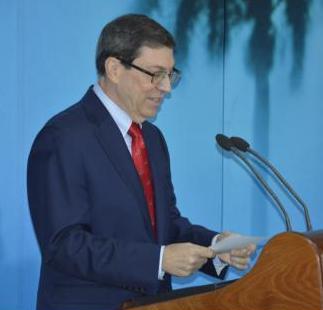 These are
unfounded allegations.
These are
unfounded allegations.
The aim is to use them as a pretext to maintain the economic blockade against Cuba and the measures of maximum pressure that have strengthened it in recent years, and which have been increasingly rejected by the international community, as well as inside the United States. The rejection includes the demand to remove Cuba from the arbitrary list of State Sponsors of Terrorism.
Cuba is not a threat to the United States or any other country. The United States implements a policy that threatens and punishes the entire Cuban population on a daily basis.
The U.S. has imposed and owns tens of military bases in our region and also maintains, against the will of the Cuban people, a military base in the territory that it illegally occupies in the province of Guantánamo.
We are witnessing a new disinformation operation, similar to the many others in the United States throughout its long history of hostility against our country.
(Minrex, June 13, 2023)
Statement by Deputy Cuban
Minister
of Foreign Affairs
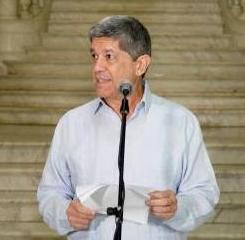 The U.S.
newspaper The Wall Street Journal
published on June 8 totally untrue and unfounded information, according
to which there allegedly exists an agreement between Cuba and China in
the military area for the establishment of a supposed espionage
facility.
The U.S.
newspaper The Wall Street Journal
published on June 8 totally untrue and unfounded information, according
to which there allegedly exists an agreement between Cuba and China in
the military area for the establishment of a supposed espionage
facility.
Notwithstanding Cuba´s sovereign rights in the area of defense, our country is a signatory to the Declaration of Latin America and the Caribbean as a Zone of Peace, subscribed in Havana in January 2014. On the bases of that declaration, we reject all foreign military presence in Latin America and the Caribbean, including the numerous military bases and troops of the United States, and especially the military base that illegally occupies a portion of our national territory in the province of Guantánamo.
Slanders such as these have been fabricated frequently by U.S. officials apparently familiarized with intelligence information, as the ones that referred to the alleged acoustic attacks against U.S. diplomatic personnel, the falsehood about non-existing Cuban military troops in Venezuela, and the lie about an imaginary existence in Cuba of biological weapon laboratories.
All of them are fallacies promoted with the malicious intention to justify the unprecedented reinforcement of the economic blockade, destabilization and aggression against Cuba, and to deceive public opinion in the United States and around the world.
U.S. hostility against Cuba and the extreme and cruel measures that provoke humanitarian harm and punish the people of Cuba cannot be justified in any manner.
(Minrex, June 8, 2023)
International Solidarity Meeting Held in Havana -- May 2, 2023
International Meeting "Solidarity with Cuba and Anti-Imperialism" Affirms Sovereignty, Independence, Peace and Progress
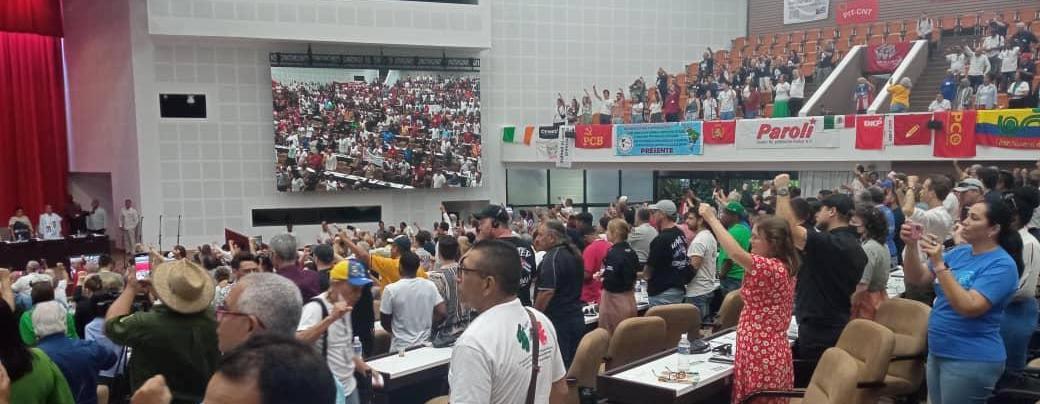
We, the over 1,000 participants at the "International Meeting in Solidarity with Cuba and Anti-imperialism, 200 years on from the Monroe Doctrine," with great pride gather again on the Island of Dignity to reaffirm our unwavering support for the Revolution and for the Cuban people.
In an extremely complex world in which the very existence of humankind is threatened, this sister nation stoically resists the intensified blockade, imposed to inconceivable degrees, by the U.S. government, in the imperialist attempt to destroy the program of social justice which, with sacrifice, courage, unity and creativity, is being created in Cuba.
We, the representatives of 271 political, youth, trade union and social organizations from 58 countries, have shared intensive sessions and exchanges of experience with workers, young people and the populace at workplaces and in neighborhoods undergoing social transformation, in which we see the capacity for resistance and creative potential that exists for overcoming enormous obstacles and privations.
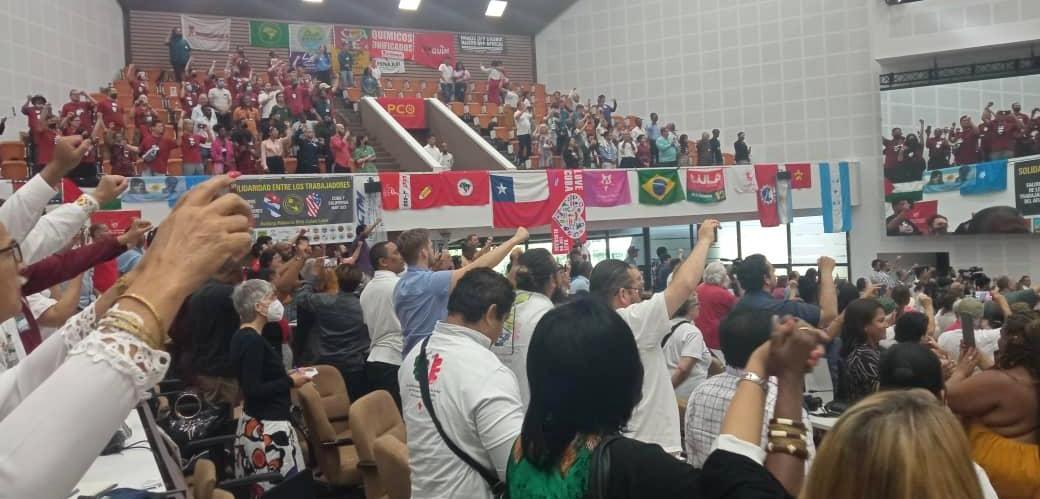
Last year, Cuba suffered three adverse events involving the loss of human lives and a high material cost: the explosion in the Saratoga Hotel, the fire at the supertanker base in the Mariel Industrial Zone and the devastating Hurricane Ian; these mobilized large amounts of resources and a wave of solidarity on the part of thousands of Cubans and friends in numerous countries -- reaffirming that Cuba is not alone.
The Cuban people are grateful to us and we to Cuba: for its anti-COVID-19 vaccines; for its medical brigades which save lives anywhere in the world; for existing, resisting and creating; for being a beacon of commitment and loyalty to the legacy of Fidel, Raúl and the generation continuing their work, which calls us together; for standing its ground with its guard up; for being a land of peace and friendship; for embracing the idea that a better world is possible and, beyond that, necessary.
U.S. imperialism and NATO are unleashing military hostilities, persisting in their attempts to intervene in the domestic affairs of other countries with the aim of toppling legitimate progressive regimes. They impose sanctions, apply unilateral coercive measures, political blackmail and the threat and use of force, thus placing world peace in grave danger and bringing closer the real possibility of a nuclear war and of the rebirth of fascism.
In the presence of these attempts to internationalize the Monroe Doctrine on its 200th anniversary, with the aim of appropriating natural resources and subjugating the peoples of the world, we call on all the democratic, progressive and revolutionary forces to:
Create a broad national and international front in the struggle for peace and against war. Launch a mass mobilization on September 21, 2023, World Peace Day, support the peace process in Colombia and defend the proclamation of Latin America & the Caribbean as a Zone of Peace.
Promote ideas and create awareness of the need for unity in diversity, in the defense of national sovereignty, self-determination of the peoples, rights of workers and the peoples, dignity and preservation of the environment.
Highlight and step up the acts of solidarity with the just causes of the peoples of Venezuela, Nicaragua, Palestine, Puerto Rico and the Sahrawi Democratic Arab Republic.
Redouble the fight in the social networks and digital platforms to counter the campaigns of lies by imperialism's media emporia and defend the identity of our peoples from the cultural neocolonialism they seek to impose on us.
Demand the immediate removal of Cuba from the illegitimate list of State Sponsors of Terrorism, imposed unilaterally, illegally and immorally by Washington -- an arbitrary and entirely groundless decision.
Require the restitution of the territory in Guantánamo illegally occupied by the United States.
Defend the humanitarian nature of the Cuban medical brigades from the campaigns of defamation and misrepresentation against their noble mission.
Mobilize and identify ourselves as defenders of the Cuban Revolution and promote actions across the five continents requiring Washington to put an end to the intensified economic, commercial and financial blockade, which harms the development and wellbeing of the Cuban people and, due to its extraterritorial nature, undermines Cuba's relations with third parties.
With Cuba's example, let us build broad anti-imperialist unity to resist and overcome the adversities -- the only path that will enable us to realize our dream that a better world is possible and necessary!
Workers of all lands, unite! Socialist Cuba has the right to exist! Long live internationalism and peace! Long live international solidarity with Cuba and the struggling peoples! Long live free Cuba! Cuba Yes, Blockade No!
Havana, May 2, 2023
(Photos: Cuba Debate, Cadena Gramonte,
Embassy of Cuba Noruega)
Human Solidarity Cannot Be Blockaded, It Remains an Indestructible Weapon of Struggle and Combat
Speech by Miguel Mario Díaz-Canel Bermúdez, First Secretary of the Central Committee of the Cuban Communist Party and President of the Republic of Cuba, at the closure of the International Meeting in Solidarity with Cuba and Anti-imperialism, held in the Havana International Conference Center on May 2, 2023, "Year 65 of the Revolution" (Verbatim version -- Presidency of the Republic)
Brothers and sisters, participants in this International Meeting in Solidarity with Cuba and Anti-imperialism; Friends:
Welcome, everyone! To this home from home! Cuba is and always will be home to the workers, because in Cuba it's the workers who are in power (Applause). Not kings, or billionaires, or the representatives of some oligarchy: the Cuban workers! (Applause).
We are grateful to you, the attendees, for your participation in this gathering, at which we share the same sentiment and the same commitment: human solidarity, solidarity with the Cuban Revolution and the causes pursued by the peoples for their true emancipation.
Celebrating International Workers' Day in the company of representatives of the working class in the movements for solidarity and friendship with Cuba is a great honor and a courageous gesture for which our heroic people offer their heartfelt thanks. It represents due homage to the legacy of Commander-In-Chief Fidel Castro, a paradigm of the Cuban people's solidarity.
You have come at one of those moments that have become commonplace in a country subjected to a brutal blockade in which life involves such difficulties as an energy crisis and shortages of all kinds.
The plan was to meet in our public squares on May 1, to celebrate Labor Day together. The weather obliged us to postpone; but to quote the proverb, to bad weather (put on a) good face.
As we are used to seeing an opportunity in every challenge, we shan't complain about the rain, we shall celebrate the 205th anniversary of one who described the exploitation of man by man as the fruit and essence of capitalism and called for unity among all the world's workers in pursuing their emancipation.
It will be Friday, May 5 when we'll be celebrating International Workers' Day in our squares, with parades and mass meetings. And we'll be commemorating also the 205th anniversary of the greatest thinker with the interests of the workers at heart: Karl Marx. So, Arise ye workers from your slumbers! (Applause).
Dear bothers and sisters: In the present times, we realize that it's an act of true commitment, courage and extraordinary effort to visit Cuba. The Cuban people and its leaders are infinitely grateful to you. The world is in the throes of a systemic, multidimensional crisis of capitalism, compounded by the COVID-19 pandemic and the armed conflicts.
April 28 last marked two centuries since the then Secretary of State (and, later, president of the Union) John Quincy Adams, pronounced his "ripe fruit" theory regarding Cuba; I quote: "There are laws of political as well as physical gravitation; and if an apple severed by its native tree cannot choose but fall to the ground, Cuba, forcibly disjoined from its own unnatural connection with Spain, and incapable of self-support, can gravitate only towards the North American union which by the same law of nature cannot cast her off from its bosom."
How wrong Adams was!
Between that April announcement and the promulgation of the Monroe Doctrine in December 1823 was a span of eight months. "America for the Americans." And today, when we are researching, when we are reading critically about what these 200 years of applying the Monroe Doctrine -- closely linked to the "ripe fruit" theory -- have meant, we must ask ourselves: Which America and which Americans were they talking about? It wasn't about seeking American integration and deploying all the human potential, resources, culture and history of America to the mutual benefit of all our peoples and countries. Their conception was that Latin America and the Caribbean should belong to the United States. That's the trap in this doctrine, and that's where we need to know how to draw the line and have the awareness to forge anti-imperialist unity and commit to the fight against imperialism.
Those ideas, which are hegemonic, which are of domination, which reflect arrogance and contempt for the peoples of Latin America, were also apparent in relation to Cuba when, in the 1960s, a U.S. State Department official wrote a memorandum recommending to the U.S. government, since most Cubans supported the Revolution, stifling the Cuban economy, so as to produce dissatisfaction, disruption, disengagement and social upheaval, which would soon put paid to the Revolution.
This same hegemonic, interventionist doctrine, which treats the Latin American and Caribbean peoples with contempt, led to the founding of the Organization of American States, defined by Raúl Roa [Cuba's then foreign minister] as a "Ministry of Colonies."
All these are hegemonic platforms of domination, arrogance and contempt; therefore our response must be, as we have discussed at this event, anti-imperialist unity! Since those times, for 200 years, the policy of our powerful neighbor has been unchanged: appropriate Cuba, Latin America and all our natural resources.
Washington is seeking to internationalize the Monroe Doctrine and, 200 years on, renews it with policies of blockade, sanctions, political/judicial measures, walls, interference, media circuses and wars.
The intensified economic, financial and commercial blockade is the main obstacle to Cuba's economic and social development; it is applied by U.S. imperialism as a means of repressing the Cuban people, breaking their unity and faith in the Revolution, in socialism, in the party and in the government. And to make bite deeper, as if that weren't enough, they have included us, yet again and entirely without grounds, on the spurious list of State Sponsors of Terrorism.
During 2022, we were stricken by two major accidents and a natural disaster, as has been mentioned here several times: the explosion at the Hotel Saratoga in Havana, the fire at the supertanker base in Matanzas, and the scourge of Hurricane Ian in western Cuba. In all three cases, as with our response to COVID-19, the Cuban people demonstrated their ability to rise to the occasion, and through willpower, solidarity and unity we were able to cope and move on.
The results in three processes of participative democracy, staged just in the last six months, show the people's trust in the Revolution -- the boundless effort to ensure social justice at its core, and in the leadership of the revolutionary process. This was shown by the people's approval of the Family Code, the elections of the delegates to the municipal assemblies of the People's Power and, more recently, the election of representatives which culminated in the constitution of the 10th Legislature of the National Assembly of the People's Power.
In this context, what are we asking of you, our friends from the world over, the people who have taken Cuba and the Cuban cause to heart? We attach high priority to escalating condemnation of the blockade in all its manifestations, while continuing to demonstrate that, despite the siege and the pressures, Cuba can progress and develop. But, as I said recently in my acceptance speech at the National Assembly of the People's Power, we must "beat the blockade without waiting for them to lift it!" And you, friends, who represent international solidarity with Cuba, are also an essential part of that joint challenge.
It is also a political and ethical imperative to denounce the inclusion of Cuba on the spurious list of State Sponsors of Terrorism, which should never have happened. Apart from being arbitrary, unjust and immoral, it has serious implications for the economy and a discouraging and intimidating effect.
It is also necessary to intensify activism and awareness among the social networks and digital platforms, on which major battles are now being waged against the campaigns of lies launched by U.S. imperialism's media emporia and their internal and external operators, in their attempt to discredit and destroy the Revolution.
What do we value, what do we ask of you? First and foremost, in response to this aggressive imperialist policy: a growing solidarity with Cuba movement, in the midst of the tremendous challenges and an extremely complex international scenario. And increased robustness and coordination among the political forces and movements -- social, popular, solidarity, pacifist, trade union, student, rural workers', women's, youth, religious, of graduates of Cuban schools and associations of Cubans resident abroad, among others. It is also heartening to note the increase in journeys to Cuba, as a safe destination, in open rejection of the restrictions imposed by Washington and the media campaigns launched from Europe and elsewhere.
We appreciate the public acts of protest against the blockade, represented by the Bridges of Love caravans and other initiatives, which have become daily occurrences, mainly at weekends, all over the world.
We welcome the idea of holding in the second half of this year the 7th African Continental Meeting in Solidarity with Cuba, in South Africa.
We support the European Unblock Cuba campaigns and the multiple solidarity initiatives which are gradually becoming a broadly-based political movement in Europe against the blockade.
We welcome the political consensus and expression of solidarity that has been achieved via the Latin American & Caribbean Continental Network in Solidarity with Cuba and Just Causes, and the Caribbean Solidarity with Cuba Network.
In difficult times, a lot of people ask: Why socialism in Cuba? Not everyone is prepared to live with an economic straightjacket, which has been opportunistically tightened more than once. This situation is so damaging to Cuban society and families that there are those who say we should give up on socialism.
Why did the Cuban Revolution choose the socialist path to prosperity? Because it's the only alternative to capitalism; because it's the best way to give power and the decisions about the country and the future, to the people. (Prolonged applause).
The Cuban Revolution is not just the response of a people to an intolerable set of abuses, after centuries of colonialism and 60 years of neocolonialism. It's the reaction of a continent and a world plagued by injustices. That's why we've never been alone in our struggles. You yourselves are an example! (Applause).
Revolution did not arrive at our shores as an import, it was born of specific socio-historic conditions and was nearly 100 years, of struggle against injustice, in the making. Its strength derives from its authenticity.
When the socialist community collapsed, and with it COMECON, and the Cuban economy shrank by over 30%, the Revolution grew politically and morally, with Fidel at the helm of a party of unity aware of its strength. The country needed five years to stop the decline and return to some degree of growth. But we grew! That is true socialism.
The alleged "Caribbean soviet satellite" survived more than the economic and political demise of the European soviet bloc; it survived the ideological disintegration and moral collapse of political parties and organizations it regarded as a role model. We were never a satellite!
All this happened in a context marked by the euphoria of neo-liberalism in Latin America: even the cemeteries and parks were sold off, and the FTAA proposal was promulgated. When Cuba was not seduced by these overtures, which rapidly revealed their sole result of increasing the indebtedness of the peoples, these acts of economic warfare became laws. In the 1990s, while socialism in Europe was crumbling and the Revolution stood firm, the U.S. Congress passed two bills: the Torricelli Act in 1992 and the Helms-Burton Act in 1996.
These were signed respectively by the Republican George Bush Sr. and the Democrat Bill Clinton, with a view to garnering votes and money from the Florida right-wing faction. Incredibly, this involved the repeal of what up to then had been a presidential prerogative, according to the experts.
It is incredible that our ability to develop is constrained by two laws of another country. Check the statistics and you'll see how the surges in migration flows coincided with the periods of greatest pressure and closure and, vice versa, how there were periods in which the migration flow was reversed when the restrictions on exchanges were eased.
What resistance and willpower have taught us is that justice for all can only be achieved through socialism -- the society for which were are fighting and will go on fighting! (Applause). Capitalism, or rather dependent capitalism, governed Cuba for 60 years and left in its wake a degree of injustice so extreme that it provoked the hemisphere's most radical revolution. Abandoning socialism after those lessons of history is not an option, because we didn't choose it at random; we chose it responsibly as an expression of the most advanced universal thinking on social justice.
Socialism is so effective in serving that noble, humanist aim, that even hamstrung, besieged, persecuted by the most powerful empire in history, we could not be suppressed or subdued.
So certain is it that only socialism offers a future of social justice that we believe that to be the primary motive for the blockade; namely, to forestall the success of an anti-capitalist, socialist system situated just 90 miles from the empire! (Prolonged applause).
Brothers and sisters: This is a moment for reaffirmation: we reaffirm that in the present complex international context, Cuba is maintaining its foreign policy of principles, solidarity and defense of just causes.
And I will restate some concepts that were aired earlier, at the opening of today's session, by Cuba's Deputy Minister of Foreign Affairs: We reaffirm our unwavering support for Venezuela's Bolivarian and Chavist revolution, for the civil-military union of its heroic people and legitimate president, comrade Nicolás Maduro Moros. (Prolonged applause and exclamations).
We reaffirm our solidarity with Sandinista Nicaragua, its people and president Comandante Daniel Ortega Saavedra (Prolonged applause and exclamations); also our solidarity with the Plurinational State of Bolivia; with President Luiz Inácio Lula da Silva, in Brazil, leader of Brazil's Workers' Party (Applause); and our unshakeable support for the efforts of the Argentine Republic to recover sovereignty over the Falkland Islands, South Georgia & the South Sandwich Islands and the surrounding waters (Applause); our commitment to the government of President Luis Arce, of the Movement for Socialism, in Bolivia, for his efforts in the country's recovery and the struggle against the coup d'état mentality (Applause); we also support the Peruvian people's cause, the government of Honduras and that country's president, Xiomara Castro.
We shall continue to defend the legitimate interests of the Caribbean nations and support their claim for reparations for the effects of slavery and colonialism.
Especially, we reaffirm our commitment to the brother people of Haiti and to the self-determination and independence of Puerto Rico.
We are grateful to our friend Andrés Manuel López Obrador, president of Mexico, for his firm support for and solidarity with the Cuban Revolution. (Applause).
We maintain our unconditional position regarding a broadly-based, just and lasting solution to the Israel-Palestine conflict by means of an equitable, definitive negotiated political settlement that guarantees the legitimate right of the Palestinian people to self-determination and to exist as a sovereign and independent state within the pre-1967 borders, with East Jerusalem as its capital. (Applause).
We stand by our unconditional solidarity with the brother Sahrawi people and their right to self determination. (Applause).
We favor continued development and strengthening of the close, friendly bonds with Syria, based on respect for self-determination, territorial integrity, rejection of terrorism and of the imposition of economic sanctions by foreign powers or international organizations. (Applause).
Our greetings to the workers of brother socialist countries. (Applause).
Cuba champions peace, cooperation, solidarity, multilateralism and dialogue, as the bases for conflict resolution and advocates the creation of a new international economic order. In parallel with this International Meeting in Solidarity, elsewhere in Havana the third round of talks is under way between the Colombian government and the National Liberation Army of Colombia (Applause). Cuba's commitment to peace in Colombia is unalterable; we will do everything in our power to ensure the success of this keenly pursued initiative of the Colombian people and our region (Applause). We are committed also to compliance with the proclamation of Latin America & the Caribbean as a Zone of Peace, as approved at the CELAC summit in 2014.
We are aware that in many countries in Asia & Oceania, Africa, the Middle East, Europe, North America and Latin America & the Caribbean, the workers stage mass demonstrations in response to neo-liberal policies that guarantee them neither employment nor social security. To all of them, we pass on a message of solidarity from the trade union movement and the Cuban Revolution, in the just causes they are now pursuing. (Applause).
We confirm our conviction that the great problems that mankind is facing now and will face in the future can only be solved through cooperation and solidarity and not by confrontation.
The triumph of the Cuban Revolution is a triumph of our people and also of the peoples represented by the international delegations and all the peoples friendly to Cuba. (Applause). The resilience of the revolutionary process within Cuban society cannot be explained except in terms of the will of the people and the laudable role of the international solidarity you offer us. (Applause).
Comrades: Those who remain until Friday [May 5] -- is that asking too much? -- will witness how Cuba's workers and people, despite the privations, celebrate International Workers' Day with joy and unity, on this occasion differently, but with the same spirit, enthusiasm and unshakeable faith in our victory. (Applause).
You have the eternal, sincere gratitude of all our people for joining us in our ceaseless struggle against the blockade.
On behalf of our people, party and government, I promise that we will preserve the revolutionary legacy of Fidel, Raúl and the many generations of Cuban patriots who fought to bring about a sovereign, independent, solidarity-embracing, democratic, socialist and noble homeland, which we are duty bound to defend at all costs. (Applause). That is the message we send with love and firm resolve to you and all the friends and peoples the world over.
The uncertain and threatening world scenario and the stark extremes forced on us by the enemies of the Revolution in seeking our subjugation through starvation and want of all kinds, sow the seeds of doubt in the minds of many, as to the real prospects for the victory we aspire to.
In history, Cuba has been through many situations like today's, but perhaps the darkest was that experienced during several days by the survivors of the Granma's landfall. Thirteen days after dispersing, following the baptism of fire at Alegría de Pío, Fidel met up again with his brother Raúl and four others, in the middle of the night in a out-of-the-way spot known as Cinco Palmas. They hugged each other. Fidel asked how many rifles they carried; Raúl replied: "Five." "With my two, seven," said Fidel, "Now we'll win the war for sure!" According to Raúl, at that point he thought his brother had lost his mind. Win the war, indeed! (Applause).
Many years after several such moments, Cuba lost its markets and socialist solidarity, while the empire and former socialists joined forces to impose a double blockade on us. Once again, as in the tank at the Bay of Pigs, Fidel led the epic battle for Cuba and socialism.
Raúl, at the head of an army which, while remaining armed, dedicated itself to producing food and medicines, showed the way and proclaimed" "Yes, it can be done!" (Applause). The generation which now carries the main responsibilities in the party, the state and the government are from that school; we are convinced that, indeed, it can be done! And that yes, we're winning the war! (Applause).
Then as now as always, we rely on your solidarity.
Unity and hope are our present and future; your solidarity reinforces unity and magnifies hope.
Human solidarity cannot be blockaded, it remains an indestructible weapon of struggle and combat and, at the same time, an everlasting message of peace that can never be silenced. Homeland is mankind! A mankind that supports the workers!
Solidarity for ever! We shall win! We shall certainly win!
Ever on to victory! (Exclamations).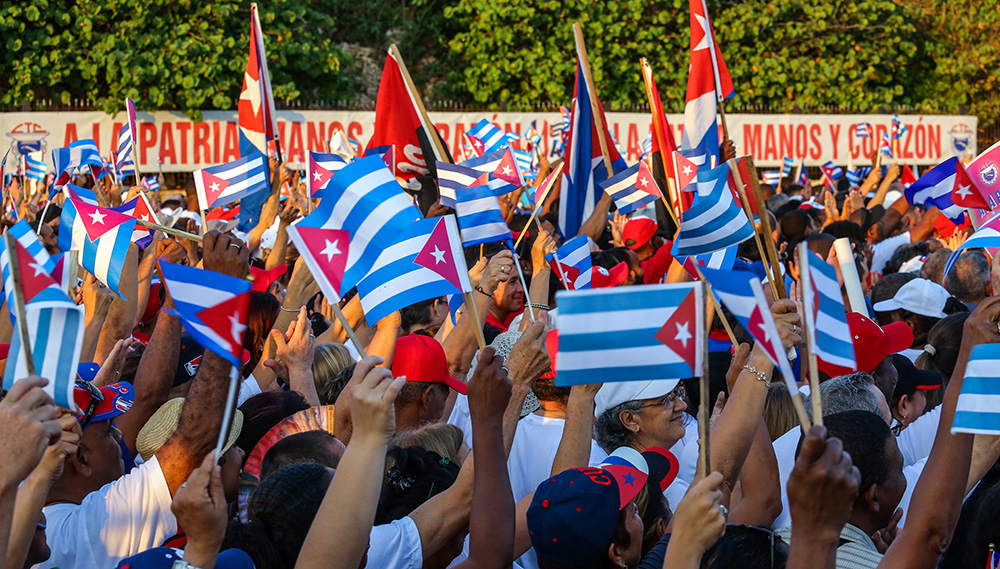
(Granma International, May 11, 2023)
(To access articles individually click on the black headline.)
Website: www.cpcml.ca Email: editor@cpcml.ca


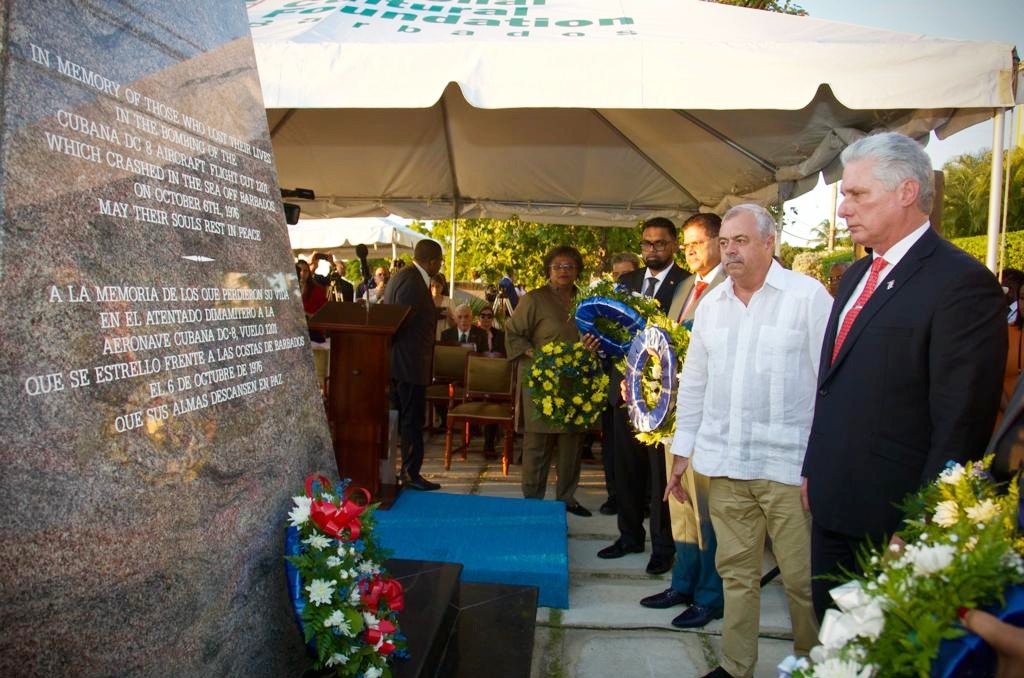 Cuban President
visits monument to the victims of Air Cubana Flight 455 in
Barbados,
Cuban President
visits monument to the victims of Air Cubana Flight 455 in
Barbados, 
